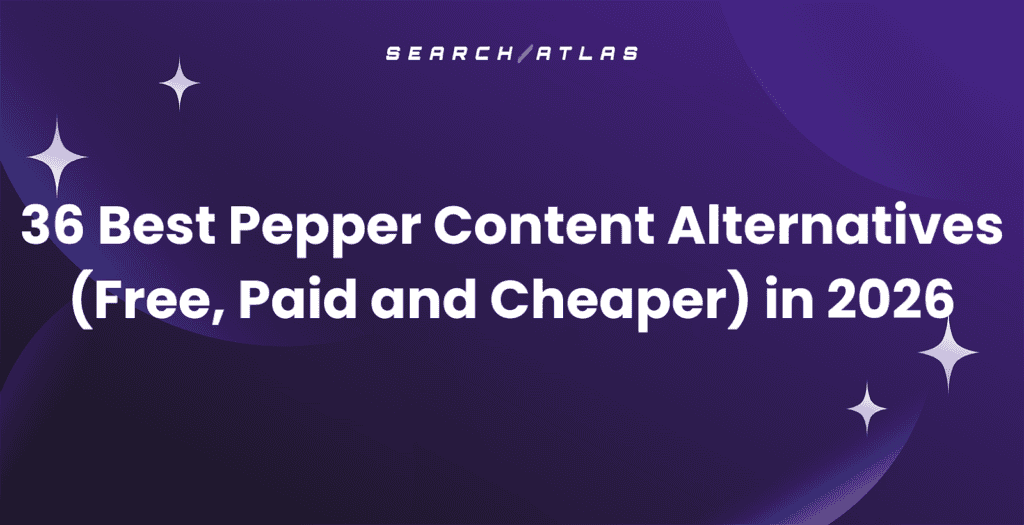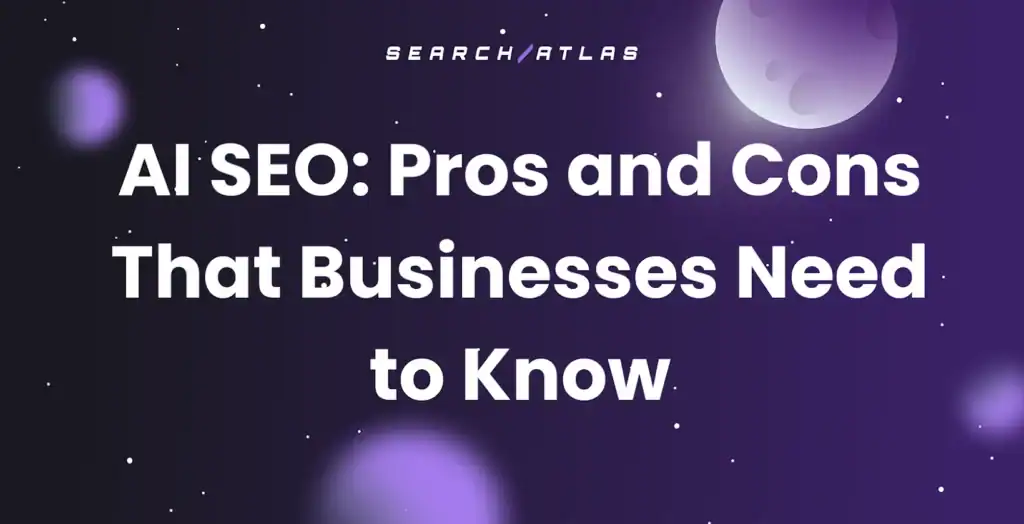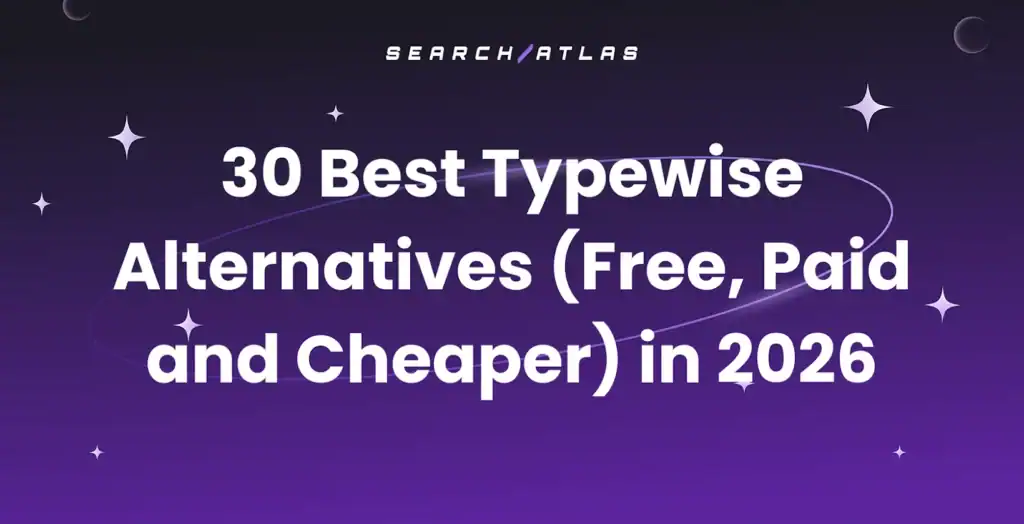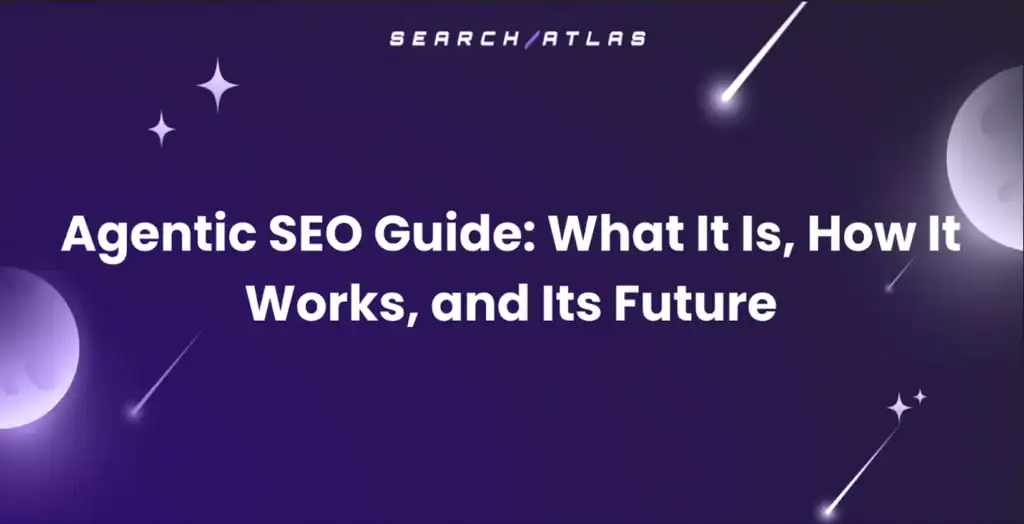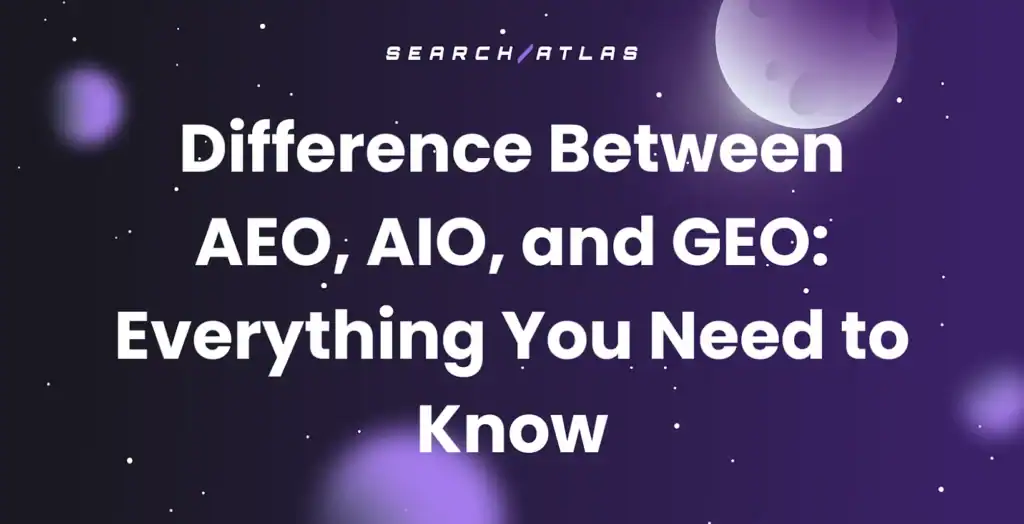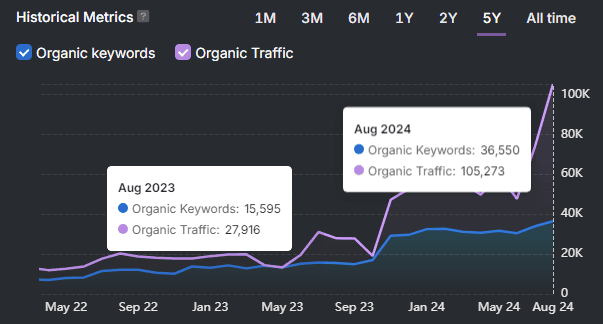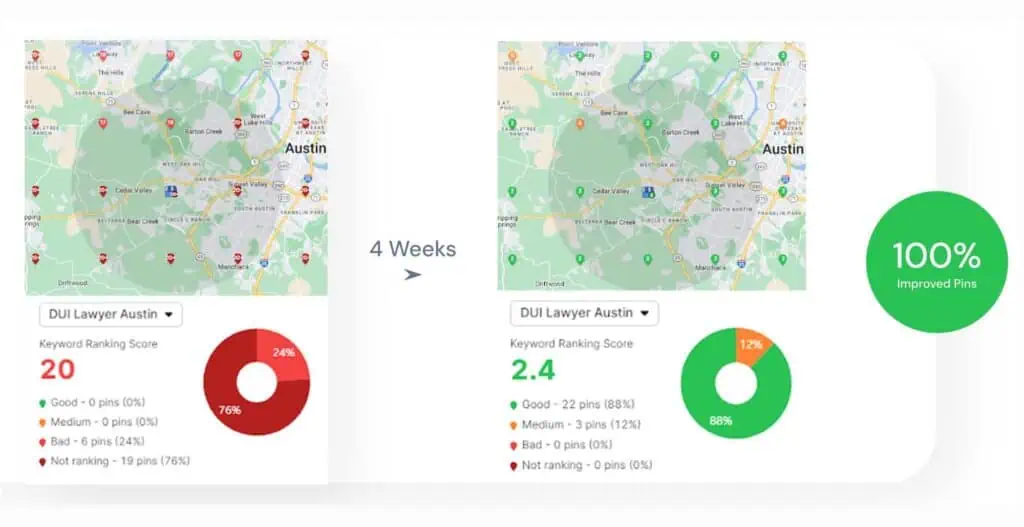Synup is a local listing management platform that centralizes business information across directories. Synup streamlines visibility for multi-location brands by publishing data to 100+ directories. It monitors reviews and tracks local rankings automatically. However, Synup reviews show that the tool misses key aggregators like Acxiom, which competitors include.
Organizations seek alternatives when the Synup pricing tier restrictions don’t match their needs. The Synup Startup plan at $99 monthly covers only up to 25 locations. Agencies that manage up to 100 client locations must jump to the $249 monthly Agency tier, or $999 for up to 500 client accounts. Businesses often need integrated technical SEO tools rather than isolated listing management.
The 3 best Synup alternatives are Search Atlas, BrightLocal, and Moz Local based on features, pricing, and directory reach. Search Atlas ranks as the #1 Synup alternative, with AI-powered local SEO automation and comprehensive keyword tracking. BrightLocal wins for smaller agencies that need citation building with white-label reports. Moz Local works best for single-location businesses that need simple distribution.
What are the Best Synup Alternatives?
The 35 best Synup alternatives are below.
| # | Synup Alternative | Best for | Pricing |
| 1 | Search Atlas | AI-powered local SEO & review automation | From $99/month |
| 2 | BrightLocal | Smaller agencies with limited locations | From $39/month |
| 3 | Moz Local | Cost-effective listings management | From $16/month |
| 4 | Yext | Enterprise listings management | From $199/year |
| 5 | Uberall | AI-powered location marketing | Quote-based |
| 6 | SOCi | Social + local listings at scale | Quote-based |
| 7 | Whitespark | Citation building services | From $14/month |
| 8 | Birdeye | Review generation & customer experience | From $299/month |
| 9 | Chatmeter | Multi-location brand management | Quote-based |
| 10 | Grade.us | White-label reputation management | From $110/month |
| 11 | NiceJob | Automated review generation | From $75/month |
| 12 | Reputation.com | Enterprise online reputation management | Quote-based |
| 13 | Reviews.io | Ecommerce review collection | From $29/month |
| 14 | ReviewTrackers | Multi-site review analysis | From $15/location |
| 15 | Vendasta | Agencies & resellers | Quote-based |
| 16 | Advice Local | Automated local search reporting | Quote-based |
| 17 | dbaPlatform | GBP listing automation | Quote-based |
| 18 | Devhub | Multi-location site management | Quote-based |
| 19 | Semrush | Full-suite SEO & competitive research | From $129.95/month |
| 20 | SE Ranking | Affordable SEO management | From $65/month |
| 21 | SEO PowerSuite | Advanced SEO analysis | From $299/year |
| 22 | Ahrefs | Backlink research & link data | From $129/month |
| 23 | Google Search Console | Free search performance insights | Free |
| 24 | Scalenut | AI-powered SEO content | From $49/month |
| 25 | WebCEO | Agency SEO toolsets | From $99/month |
| 26 | Mangools | Simple keyword & rank tracking | From $24.50/month |
| 27 | Serpstat | Affordable SEO & PPC suite | From $69/month |
| 28 | Hootsuite | Social media marketing management | From $149/month |
| 29 | Brand24 | Social media listening | From $99/month |
| 30 | Marketing 360 | All-in-one SMB marketing | From $395/month |
| 31 | Hibu (RevLocal) | Managed local marketing services | Quote-based |
| 32 | MyPresences | Automated listings & reviews | From $15/location |
| 33 | SearchManipulator | Reputation management | Quote-based |
| 34 | Rio SEO | Enterprise local SEO | Quote-based |
| 35 | MomentFeed | Multi-location marketing | / |
1. Search Atlas: Best Synup Alternative
Search Atlas is the best Synup alternative in 2025. Search Atlas is an AI-powered SEO platform for agencies and businesses that need AI-driven SEO automation combined with local listings and review workflows.
Search Atlas integrates technical audits, keyword research, local SEO heatmaps, and review generation into one platform, which matters for agencies that want consistent client reporting and automation across content, rankings, and GBP (Google Business Profile).
Search Atlas provides AI-powered optimization through OTTO SEO, localized rank tracking with detailed heatmaps, and full GBP management that extends to reviews, posts, and profile analytics. Agencies use Search Atlas to unify local SEO campaigns, automate reporting, and scale client deliverables in one dashboard (rank tracking, content optimization, citations).
Search Atlas features include local SEO heatmaps with four-mile radius ranking data, AI content creation with 1-click optimization, topical map and keyword clustering for regional campaigns, GBP Galactic management with review invites, automated local SEO reports, on-page and sitewide audits, citation ordering, and LLM (Large Language Model) visibility dashboards for AI search tracking.
Search Atlas is an alternative to Synup because it emphasizes automation, AI, and content depth, while Synup focuses on listings and client OS features. Search Atlas provides advanced campaign execution and scalable reporting for SEO-driven agencies, whereas Synup centers on account management and review invites.
Search Atlas pricing starts at $99/month for the Starter with 2,000 tracked keywords and two seats. Growth is $199/month for 3,500 keywords and three seats. Pro is $399/month with 6,000 keywords and five seats. Enterprise is quote-based with API access and tailored quotas.
Compared to the Synup Startup plan at $99/month with location limits, Search Atlas costs the same but offers much broader SEO and AI automation without per-location restrictions.
Pros in the Search Atlas review mention agency-level scalability, precise heatmaps, AI-driven content optimization, scalable keyword and backlink databases, and white-label dashboards that streamline agency workflows. The con of Search Atlas is a learning curve for smaller teams.
2. BrightLocal: Best Synup Alternative for Small Agencies with Limited Locations
BrightLocal is the best Synup alternative for small agencies that manage only a handful of locations and want transparent, location-based pricing. BrightLocal specializes in citation audits, GBP (Google Business Profile) management, and review campaigns, which matters for agencies that want focused local SEO tools without committing to higher-volume plans.
BrightLocal provides rank tracking across mobile and desktop, citation audits with optional pay-as-you-go citation building, listings synchronization on Google, Bing, Facebook, and Apple, review monitoring with customizable widgets, and bulk GBP posting. Agencies use BrightLocal to manage client reporting and review generation in one streamlined dashboard (citations, reviews, rankings).
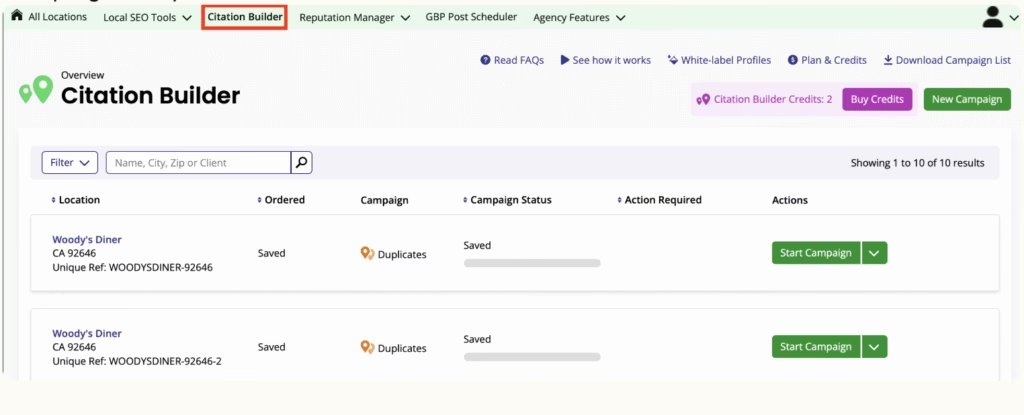
BrightLocal features include citation tracker, GBP audits with edit suppression, local search grids for geo-specific rankings, automated review campaigns, white-label reporting for agencies, and an agency lead generator. Additional services include a Yext replacement offering and scalable citation packages.
BrightLocal is an alternative to Synup because it offers granular pricing by location, while Synup bundles larger location blocks into its OS model. BrightLocal is more suitable for boutique agencies with fewer clients, whereas Synup provides better value for higher-volume use cases.
BrightLocal pricing starts at $39/month for 1 location, $59 to $79/month for 2 to 5 locations, and $149 to $269/month for 21 to 30 locations, depending on features. Compared to the Synup Startup plan at $99/month for 25 locations, BrightLocal is cheaper for smaller accounts, but becomes more expensive once agencies manage more than 20 locations.
The advantages listed in the BrightLocal review highlight transparent per-location pricing, accurate rank tracking, effective review campaigns, and customizable reporting. The disadvantages of BrightLocal are higher costs at scale compared to Synup, slower directory updates for citations, and a dated interface for bulk management.
3. Moz Local: Best Synup Alternative for Cost-Effective Listings Management
Moz Local is the best Synup alternative for businesses that want affordable listings management with built-in review monitoring and social posting. Moz Local is an SEO tool that focuses on distributing business data across major directories, tracking local presence with GeoRank, and providing engagement tools for small to mid-sized businesses.
Moz Local features include citation management across 90+ directories, GBP sync, review alerts with response templates, competitor analysis, GeoRank tracking for map pack visibility, and a full social posting suite that covers Google, Facebook, Instagram, LinkedIn, TikTok, and X.
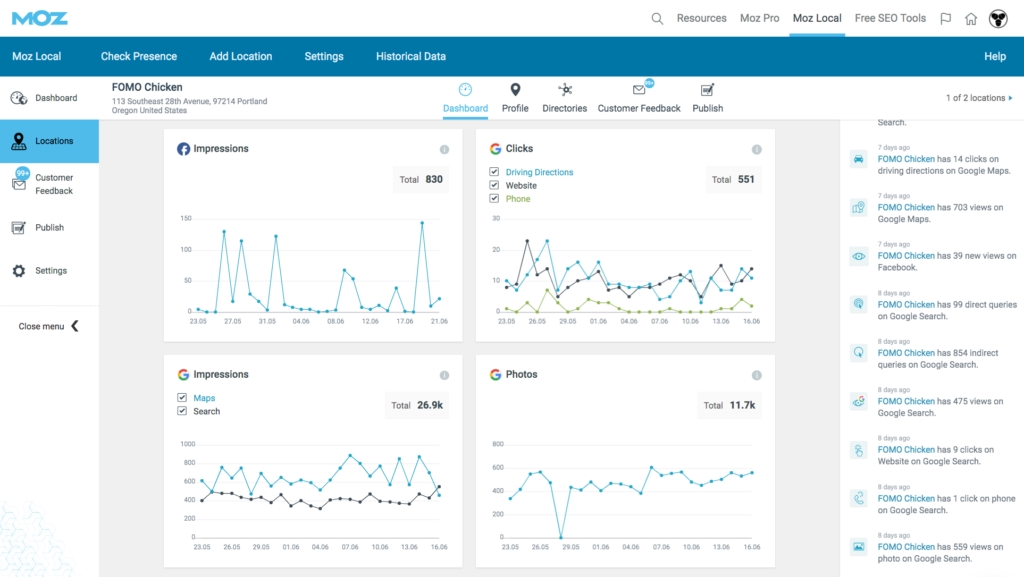
Businesses use Moz Local to centralize their reputation, social activity, and local rankings without the complexity of multi-tool setups.
Moz Local differs from Synup because it offers entry-level plans starting at a lower price point, which suits small businesses and single-location operations. Synup is more attractive for agencies and multi-location brands because its OS model scales better, while Moz Local targets users who want lower-cost management with AI-driven add-ons like Listings AI and Reviews AI.
Moz Local pricing starts at $16/month ($199/year) for the Lite plan, which includes core directory sync, review monitoring, and GeoRank tracking. The Preferred plan is $24/month ($299/year), adding review responding, sentiment analysis, competitor tracking, and social posting. The Elite plan is $33/month ($399/year), including Listings AI by default and extended social media integrations.
Compared to Synup ($99/month), Moz Local is far cheaper for small businesses, but becomes less competitive when scaling above 10 to 20 locations.
Our Moz review highlights the affordability, simple reporting, and ease of managing listings across platforms in Moz Local. The cons of Moz Local are slower data refresh rates compared to Synup, limited international coverage, and reliance on add-ons for AI features.
4. Yext: Best Synup Alternative for Enterprise Listings Management
Yext is the best Synup alternative for enterprises that need maximum directory coverage, real-time updates, and compliance-grade infrastructure. Yext is designed for large multi-location brands, franchises, and Fortune 500 companies that manage hundreds or thousands of locations at scale.
Yext centralizes business data across 200+ publishers, including Google, Apple Maps, Bing, Facebook, Yelp, Amazon Alexa, and ChatGPT, using direct API integrations instead of data aggregators.
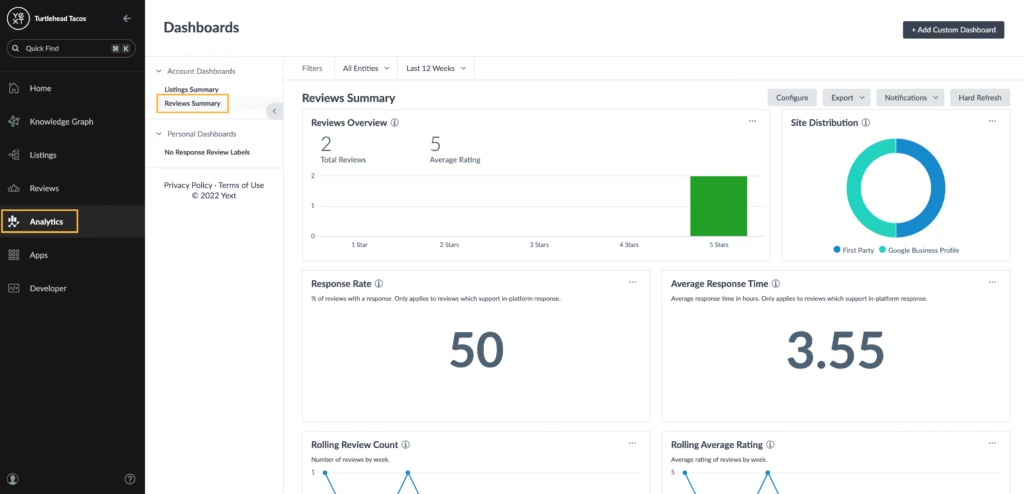
Key features of Yext include PowerListings+ for large-scale distribution, duplicate suppression to merge conflicting entries, data locking to prevent third-party overwrites, Knowledge Graph for AI search optimization, review monitoring across major platforms, and AI-powered on-site search.
Yext offers custom integrations with enterprise systems like CRM (Customer Relationship Management), POS (Point of Sale), and business intelligence platforms.
Compared to Synup, Yext delivers 150% broader distribution reach (200+ publishers vs. 80), real-time updates within 24 hours instead of 2 to 4 weeks, and enterprise-only features like data locking.
This makes Yext better suited for enterprises requiring guaranteed accuracy, regulatory compliance, and global consistency. At the same time, Synup appeals more to SMBs (Small and Medium-sized Businesses) and agencies that prioritize cost efficiency.
Yext pricing starts at $199/year for the Emerging plan and rises to $999/year for Premium plans with advanced analytics and review monitoring. Enterprise subscriptions usually range from $5,000 to $50,000+ annually, depending on scale and location count.
Compared to Synup Standard at $419.88/year, the single-location plans in Yext are 64% to 330% more expensive, and enterprise packages cost several times more.
The strengths included in the Yext review are the largest verified publisher network, direct API syncing without delays, strong compliance credentials (SOC 2, GDPR, HIPAA), and proven ability to manage millions of listings.
However, reviews cite high costs for small businesses, mandatory annual contracts, listings disappearing after cancellation, and vendor lock-in, which affect long-term flexibility. Clients note account manager turnover, which affects continuity of service.
5. Uberall: Best Synup Alternative for AI-Powered Location Marketing
Uberall is the best Synup alternative for AI-powered location marketing that combines listings, reviews, social engagement, and analytics into one multi-location platform. Uberall is a local SEO tool built for enterprises and franchises that need to improve visibility, consistency, and engagement in 125+ directories, search engines, and AI-driven platforms.
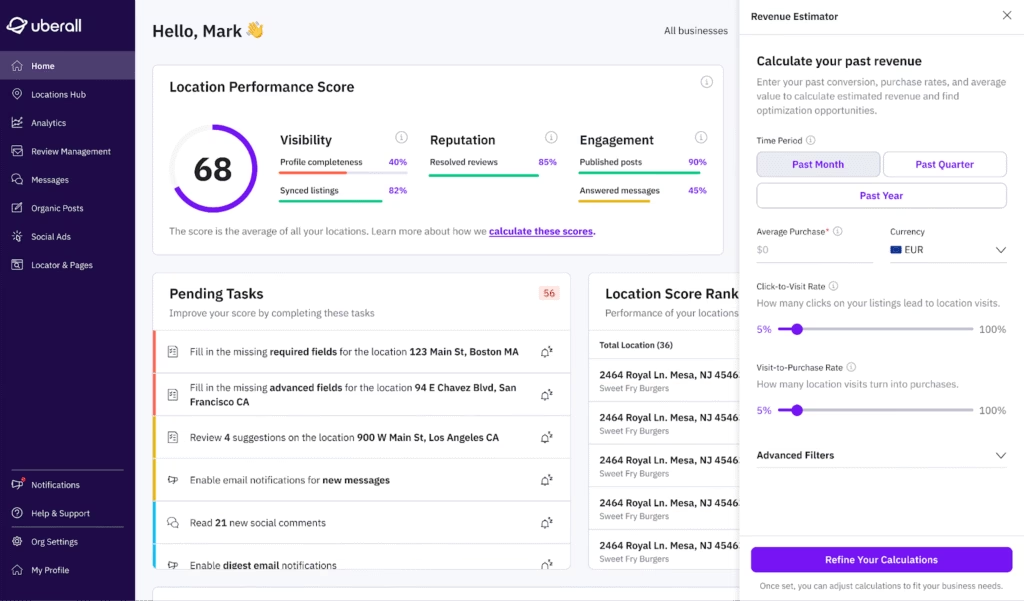
Uberall centralizes listings management with real-time updates, review monitoring with AI-assisted replies, unified customer messaging across Google, Facebook, and Instagram, and social publishing with localized AI-powered content.
The Uberall Location Performance Optimization (LPO) technology and UB-I, the first AI agent for location marketing, automate bulk actions across reviews, listings, and social channels to increase visibility and engagement at scale.
Compared to Synup, Uberall provides stronger AI automation, broader integrations, and enterprise-level features such as locator pages and advanced analytics.
Synup remains more cost-friendly for agencies with smaller client counts, while Uberall is tailored for large-scale brands that seek consistent accuracy and AI-enhanced workflows.
Uberall pricing is available only via custom quotes, with packages such as Show Up, Stand Out, and Connect offering modular features and add-ons. In practice, the Uberall enterprise subscriptions typically exceed the Synup Scale plan at $99/month, which makes Uberall significantly more expensive for small agencies but aligned with enterprise budgets.
The advantages mentioned in Uberall review are enterprise scalability for thousands of locations, AI-driven workflow automation that reduces manual tasks, and high ROI (return on investment) from location performance campaigns (Pret A Manger, KFC, Lakrids by Bülow).
The disadvantages of Uberall include higher pricing, a lack of transparent public plans, and a steep onboarding curve for smaller teams.
6. SOCi: Best Synup Alternative for Social and Local Listings at Scale
SOCi is the best Synup alternative for enterprises that use integrated social media, listings, and reputation management across large location networks. The SoCi SEO platform is designed for franchises, multi-location brands, and agencies that require governance, compliance, and distributed publishing at scale.
SOCi provides centralized dashboards for social media management (Facebook, Instagram, LinkedIn), listings distribution across directories (Google, Yelp, Apple Maps), and review response automation (Google Reviews, Facebook Reviews, Trustpilot). SoCi uses AI to generate suggested responses, which account managers review before publishing.
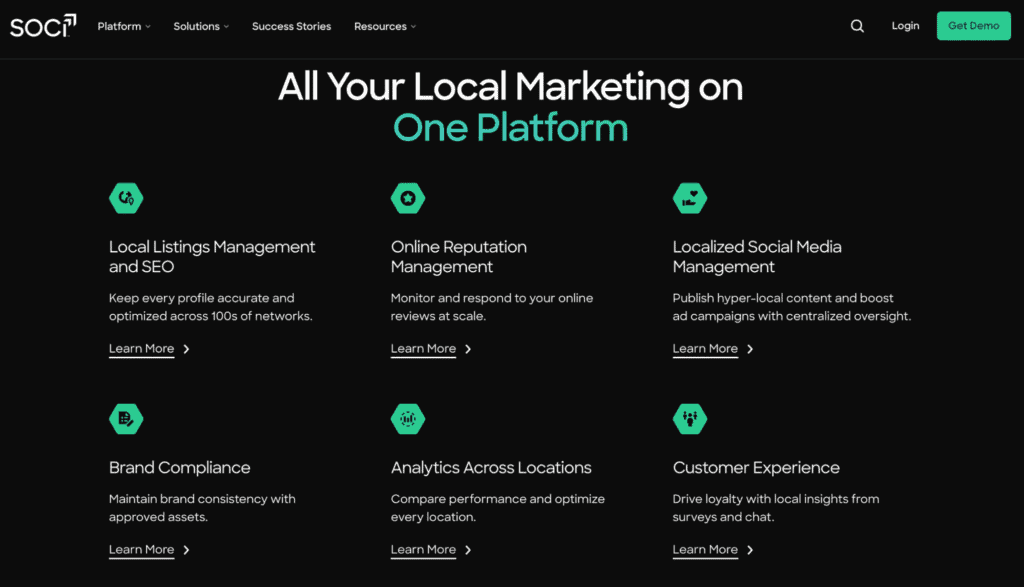
Compared to Synup, SOCi uses more advanced social media workflows. Synup provides efficient directory updates and review collection for SMBs and agencies.
SOCi focuses on enterprise networks that require role-based permissions, approval chains, and localized publishing for each market.
SOCi pricing depends on contract size, number of locations, and selected modules. Customer reports indicate pricing starts from $400/month for portfolios of 50 locations. Costs reach several thousand dollars per month for national enterprises, which exceeds Synup Scale at $999/month for unlimited locations.
According to our SOCi review, the strengths include centralized control across thousands of listings, AI-assisted review management, and workflow automation for distributed social media publishing. Clients report strong compliance tools for multi-location governance, reliable uptime during high-volume campaigns, and scalability across large enterprises (hospitality, retail, automotive).
Reported SoCi limitations include complex onboarding which requires dedicated training, high monthly cost for mid-market agencies, and slower response times from customer service during peak periods.
7. WhiteSpark: Best Synup Alternative for Citation Building Services
WhiteSpark is the best Synup alternative for businesses and agencies that require accurate citation discovery and manual citation building. WhiteSpark delivers tools for local SEO visibility and services for correcting inconsistent business data across online directories.
WhiteSpark targets SMBs, agencies, and enterprises that need local search control for industries tied to physical presence (dental, real estate, legal).
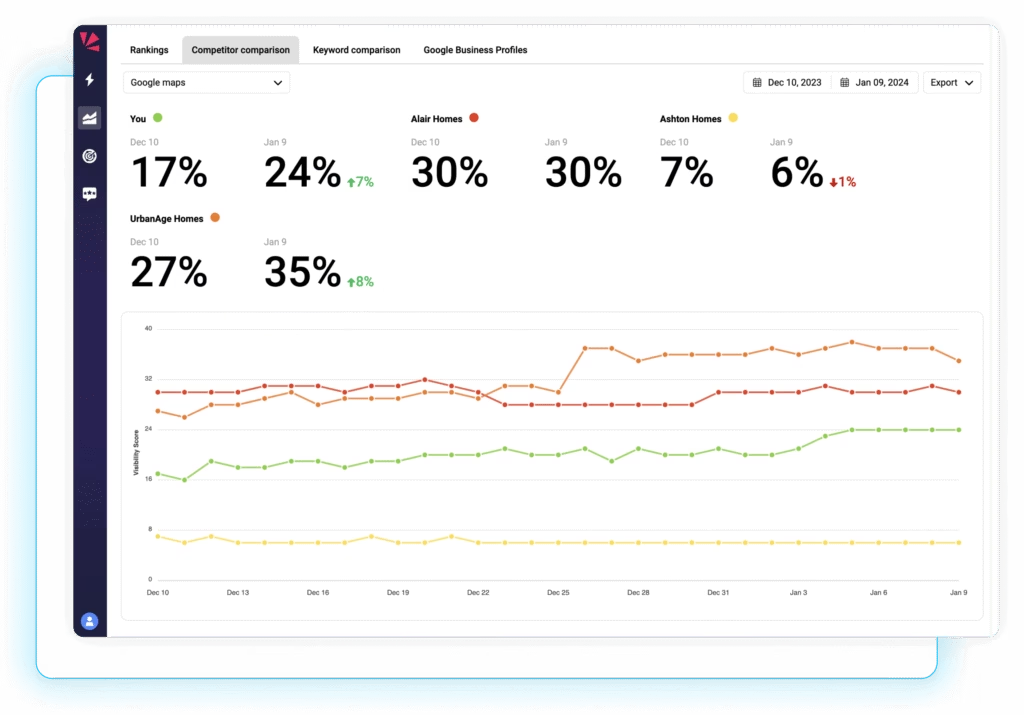
WhiteSpark features Local Citation Finder, Local Rank Tracker, Reputation Builder, and Google Business Profile management. Local Citation Finder identifies missed listings by analyzing competitor profiles across directories, blogs, and government websites (Dentists, Restaurants, Attorneys).
WhiteSpark Local Rank Tracker monitors organic rankings, Map Pack visibility, and competitor performance at the ZIP code or GPS-coordinate level (Los Angeles, New York, Chicago). Reputation Builder automates review requests and aggregates customer sentiment across platforms (Google, Facebook, Better Business Bureau).
Compared to Synup, WhiteSpark emphasizes citation accuracy through manual services and directory audits instead of automated aggregator feeds. WhiteSpark provides unlimited searches on paid plans, location-specific ranking data, and detailed reputation metrics. Synup offers broader automation but fewer tools for precise citation targeting.
WhiteSpark pricing follows a modular model. Local Rank Tracker costs $14 to $200/month, depending on tracked locations. Local Citation Finder costs $33 to $149/month based on search volume. Reputation Builder costs $79/location monthly. Citation building services use one-time payments, starting at $100 per campaign, with $2 per update.
Synup Standard costs $419.88 per year, which makes WhiteSpark more flexible in entry cost but more expensive at scale when multiple services are combined.
The main pros noted in the WhiteSpark review include specialized local focus, strong citation opportunities beyond basic directories, and transparent ownership of listing credentials. WhiteSpark limitations involve a narrow scope, a lack of backlink or technical SEO tools, and a higher total expense for agencies requiring multiple functions.
WhiteSpark is reliable as a Synup alternative for local SEO campaigns, but unsuitable as a full SEO platform.
8. Birdeye: Best Synup Alternative for Review Generation & Customer Experience
Birdeye is the best Synup alternative for enterprises and multi-location brands that prioritize automated review generation, customer messaging, and AI-driven reputation management. Birdeye centralizes review acquisition, social publishing, messaging, and customer feedback across industries with high regulatory demands (healthcare, finance, real estate).
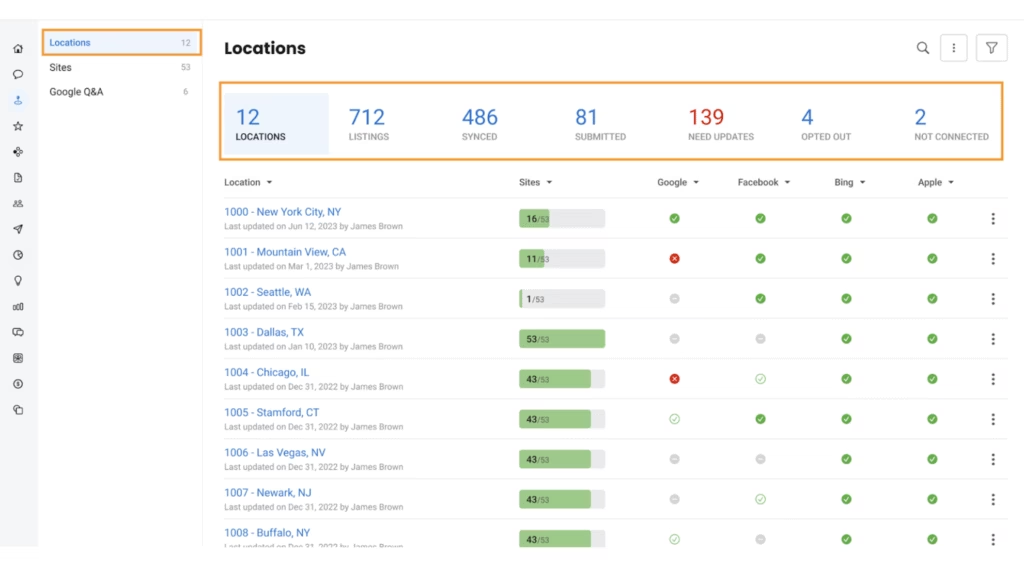
Birdeye features AI review agents that automate customer review requests, sentiment analysis across platforms, and pre-built templates for responses. It provides listings synchronization across major directories, AI social posting with multi-location scheduling, customer messaging through SMS and chat, and competitive benchmarking dashboards (Google, Facebook, Yelp). BirdAI, the proprietary system, adapts to brand tone and context for enterprise users.
Compared to Synup, Birdeye emphasizes review generation at scale. It uses AI to automate multi-channel review requests, manages structured customer feedback, and integrates surveys with business intelligence tools.
Synup provides broader local SEO functionality with citation accuracy and listing control but does not match the Birdeye review automation and customer experience depth.
Birdeye pricing uses a per-location subscription model with three tiers. Starter provides Reviews AI, Listings AI, and Messaging AI. Growth adds Social AI. Dominate includes Chatbot AI and the full feature set. Each plan requires a scheduled quote, and the company does not publish fixed prices.
Industry comparisons and user reports indicate starting rates of roughly $299/month per location, with advanced tiers exceeding $1,500/month for enterprises with multi-location deployments. Synup Standard costs $419.88/year for a single location, which makes Birdeye substantially more expensive but focused on enterprise-grade review automation and customer experience.
The strengths highlighted in the Birdeye review include advanced review automation with AI, unified dashboards combining reviews, social, and customer messaging, and industry-specific compliance (GDPR, HIPAA, CCPA).
Birdeye weaknesses involve high costs relative to Synup, opaque enterprise pricing requiring sales calls, and potential over-complexity for SMBs that only need citation accuracy.
9. Chatmeter: Best Synup Alternative for Multi-Location Brand Management
Chatmeter is the best Synup alternative for enterprises that require multi-location reputation management, listing accuracy, and customer experience analytics at scale. Chatmeter specializes in centralizing reviews, listings, and social monitoring for brands operating across dozens or hundreds of physical locations.
Chatmeter provides listings management to ensure NAP (Name, Address, Phone) consistency across platforms, review monitoring with AI-assisted sentiment analysis, social media scheduling, and customer messaging in one dashboard.
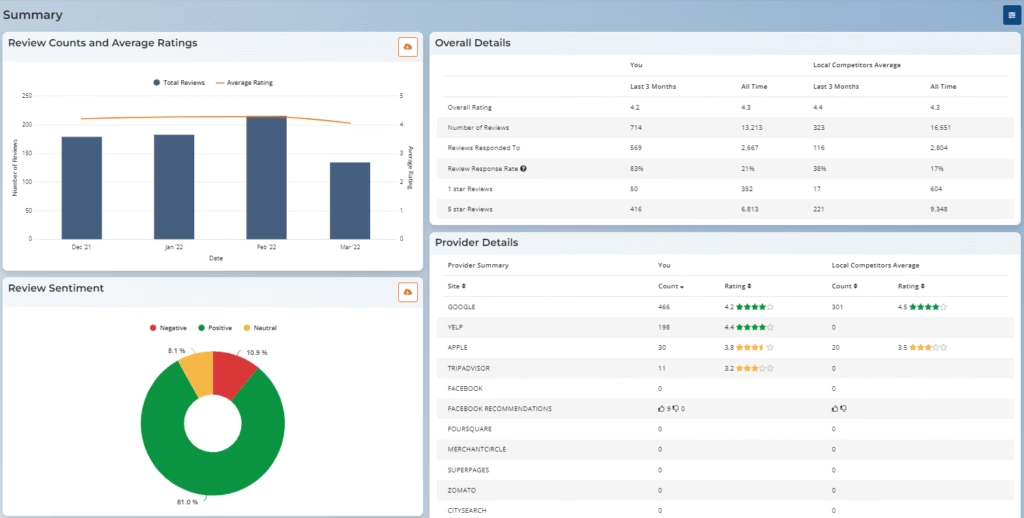
Chatmeter Pulse AI powers competitive benchmarking, customer sentiment tracking, and workflow automation across distributed teams. The platform integrates with CRM, business intelligence, and marketing systems (Salesforce, Tableau, HubSpot).
Compared to Synup, Chatmeter focuses on large-scale enterprises. It provides deeper analytics, AI-driven insights, and enterprise reporting across hundreds of locations, while Synup targets SMBs with simplified dashboards and lower pricing. Chatmeter is built for industries that require detailed compliance and customer experience reporting (healthcare, finance, automotive).
Chatmeter pricing follows a per-location model with unlimited users. Exact costs are available only through quotes, but industry reports indicate $15 to $30 per location monthly for small portfolios, which scales into hundreds of dollars per location for enterprises that manage 100+ sites. This makes Chatmeter more expensive than Synup but better suited for national and global enterprises.
Our Chatmeter review highlights pros like AI-powered sentiment analysis, centralized review response, accurate listings management across large portfolios, and detailed reporting that simplifies executive visibility.
The cons of Chatmeter include opaque pricing that requires sales calls, a higher total cost for small businesses, and a learning curve that requires onboarding resources.
10. Grade.us: Best Synup Alternative for White-Label Reputation Management
Grade.us is the best Synup alternative for agencies that need white-label reputation management and review generation across multiple clients. Grade.us specializes in enabling agencies to customize the platform with their own branding, making review management a billable service within a client package.
Grade.us provides features for review monitoring in major platforms (Google, Yelp, Facebook), automated review requests through SMS and email, reporting dashboards with white-label customization, listings management, and API access for deeper integrations. Grade.us supports review marketing by publishing testimonials across websites and social profiles.
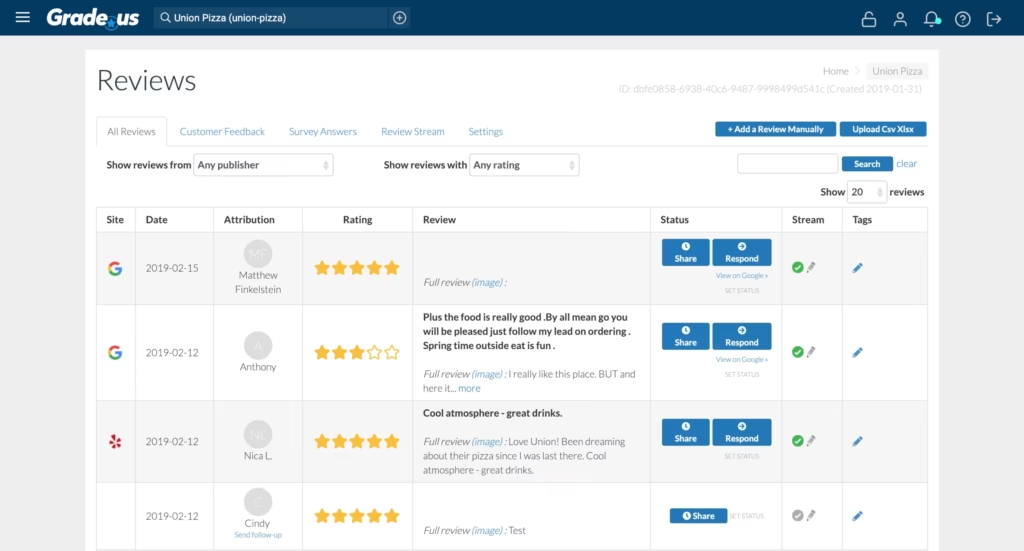
Grade.us is an alternative to Synup because it focuses specifically on white-label review management for agencies, while Synup balances review management with directory listings, analytics, and AI content tools.
Agencies that prioritize client-facing customization and automated review flows benefit more from Grade.us, while Synup appeals to SMBs that require a broader local SEO suite.
Grade.us pricing starts at $110/month for 1 location, $180/month for 3 locations, and $400/month for 10 locations. Enterprise packages are available for larger agency portfolios. Synup Standard costs $419.88 per year for one location, which makes Grade.us 3 to 4 times more expensive for a single brand but more profitable for agencies that are reselling it at scale.
According to the Grade.us review, the strengths lie in white-label customization, automation of review requests, and centralized dashboards that improve efficiency for agencies that manage multiple clients (marketing firms, franchise consultants, digital agencies).
Reported drawbacks of Grade.us include higher cost per location, limited SEO features beyond reviews, and slower onboarding for large portfolios compared to all-in-one SEO alternatives.
11. NiceJob: Best Synup Alternative for Automated Review Generation
NiceJob is the best Synup alternative for small businesses that need automated review generation, referral campaigns, and social proof publishing without enterprise-level complexity. NiceJob is a local SEO tool that focuses on increasing online reviews, building customer trust, and converting engagement into leads through automation designed for local businesses.
NiceJob features automated review requests through SMS and email, AI-assisted replies, referral campaign workflows, repeat customer reminders, gifting options, and social proof widgets for websites. The Pro plan extends functionality with competitor insights, repeat business automation, and advanced AI integrations for response and content scheduling.
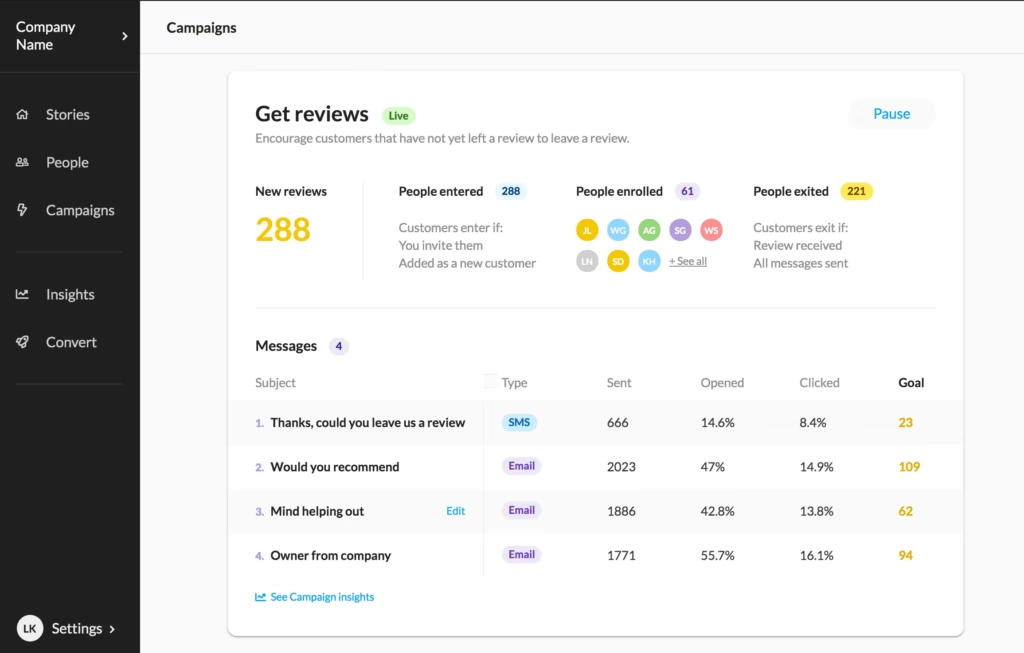
Compared to Synup, NiceJob is an alternative because it emphasizes automated review generation and referrals as its core value, while Synup provides a wider local SEO suite, including directory listings and analytics.
NiceJob is a better alternative to Synup for owners who want fast review growth and simple setup, while Synup appeals to agencies and SMBs that require directory management and multi-location data control.
NiceJob pricing starts at $75/month for the Reviews plan and $125/month for the Pro plan. Website bundles cost $99 per month plus a $199 setup fee. This makes NiceJob Pro more expensive than Synup Standard at $99/month, but it offers faster ROI for businesses focused only on reviews and referrals.
The advantages highlighted in the NiceJob review are automation simplicity, strong customer service, and consistent increases in reviews and referrals (home services, hospitality, professional services).
Reported drawbacks of NiceJob include limited SEO features outside review workflows, reliance on integrations that occasionally break (Zapier), and higher per-month costs compared to annual tools.
12. Reputation: Best Synup Alternative for Enterprise Online Reputation Management
Reputation is the best Synup alternative for enterprise online reputation management. Reputation is an AI-native reputation performance platform designed for large enterprises that need to manage customer feedback and brand perception across multiple channels and locations.
Reputation integrates first-party and third-party data streams to deliver real-time insights, benchmarks, and predictive recommendations.
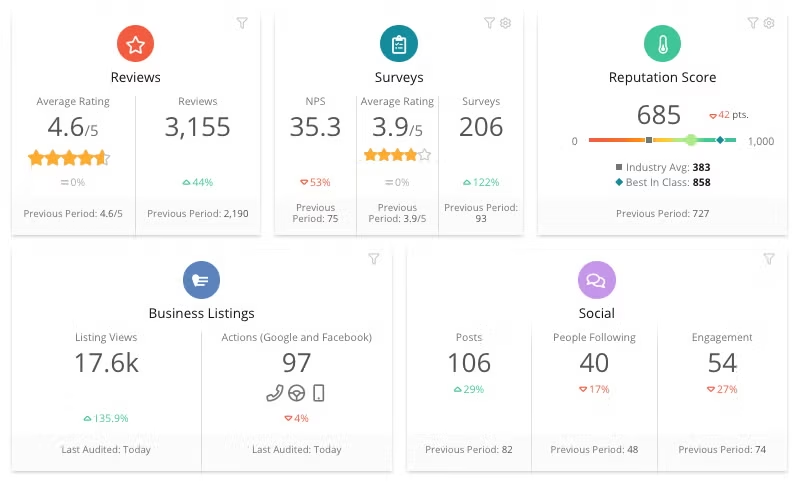
Reputation.com covers multi-channel feedback, competitive benchmarking, sentiment tracking, and an AI-based Rep Score that measures engagement and brand trust beyond standard metrics like NPS (net promoter score). Enterprise brands in healthcare, automotive, property management, and hospitality use Reputation to turn customer feedback into revenue-driving action and strengthen consumer confidence.
As an alternative to Synup, Reputation operates at a broader scale with advanced AI infrastructure, multi-location analytics, and enterprise compliance features.
While Synup focuses on listing accuracy and SMB-friendly local SEO tools, Reputation prioritizes enterprise-wide trust management, predictive modeling, and real-time customer experience optimization.
Reputation does not list public pricing on its website. It offers customized plans for enterprises, franchises, and regulated industries. This makes it best suited for organizations with complex, multi-location operations that require AI-powered insights and scalability, rather than smaller businesses that are looking for cost-friendly listings management.
The pros included in the Reputation.com review are enterprise-ready scalability, predictive AI insights, custom Rep Score benchmarking, and robust multi-location management.
The main con of Reputation is the lack of transparent pricing, which makes it difficult for smaller businesses to gauge affordability before engaging with sales.
13. Reviews.io: Best Synup Alternative for E-commerce Review Collection
Reviews.io is the best Synup alternative for e-commerce review collection. Reviews.io is a review management and customer feedback platform designed for e-commerce brands that want to strengthen conversions with authentic product and company reviews.
Reviews.io helps businesses collect and display user-generated content across websites, social media, and email campaigns, and makes customer feedback a central driver of trust and sales.
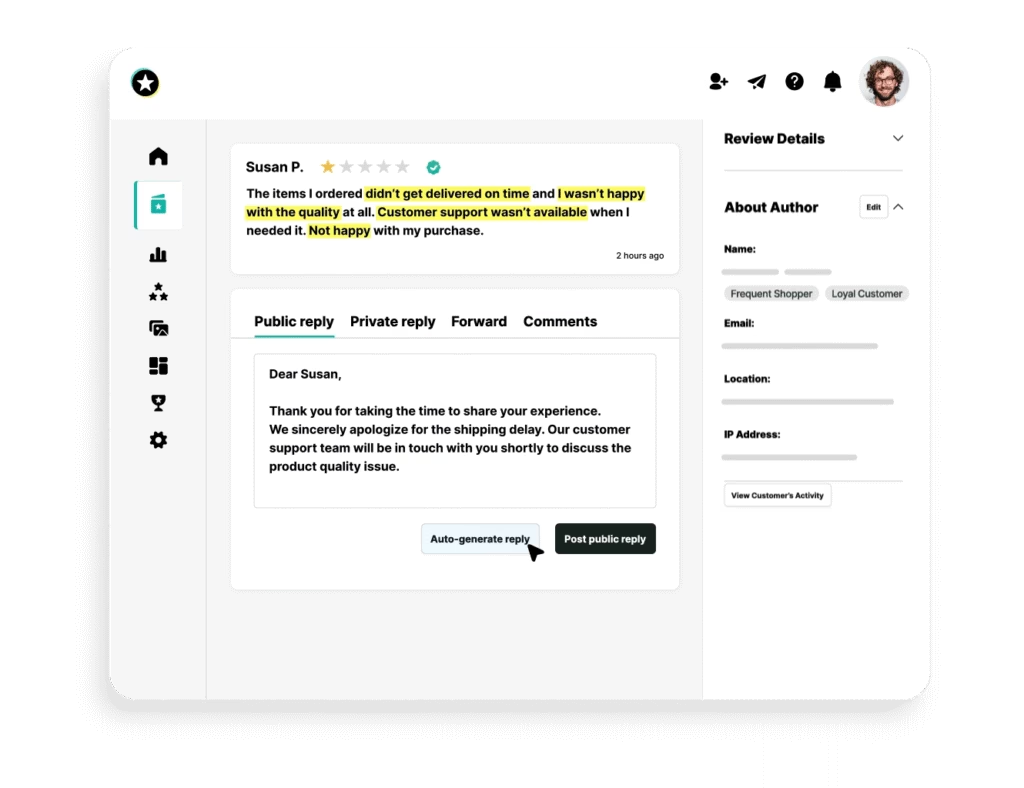
The Reviews.io platform offers advanced review invitation flows, multi-channel collection campaigns, and AI-powered review replies. It supports video reviews, product page integration for Google Shopping, and a Reputation Manager that tracks ratings across third-party platforms.
Compared to Synup, which focuses on listing accuracy and local SEO insights, Reviews.io is better suited for e-commerce merchants looking to maximize product page performance and customer trust signals.
Review.io integrates directly with Shopify, Klaviyo, and other e-commerce tools and gives online sellers a more specialized workflow for scaling review generation and conversion optimization.
Reviews.io starts at $29/month for the Essentials plan with 300 review invites, while Synup pricing begins at $99/month. Higher tiers on Reviews.io range up to $499/month with 10,000 invites, API access, and shoppable UGC (User-Generated Content).
Reviews.io is a more cost-flexible option than Synup for e-commerce businesses, especially those starting small, while still scaling to enterprise needs.
The upsides noted in the Reviews.io review are seamless e-commerce integrations, strong UGC and video review capabilities, AI-assisted replies, and customizable review invitation flows.
The main limitation of Reviews.io is that it does not provide the broader local SEO or listings management functionality that platforms like Synup or Yext include.
14. ReviewTrackers: Best Synup Alternative for Multi-Site Review Analysis
ReviewTrackers is the best Synup alternative for multi-site review analysis. ReviewTrackers is an online reputation management and analytics platform built to help multi-location businesses monitor customer feedback, analyze sentiment, and improve brand experiences.
ReviewTrackers centralizes reviews from 100+ sources, which enables teams to track performance, benchmark against competitors, and uncover insights that support both retention and acquisition strategies.
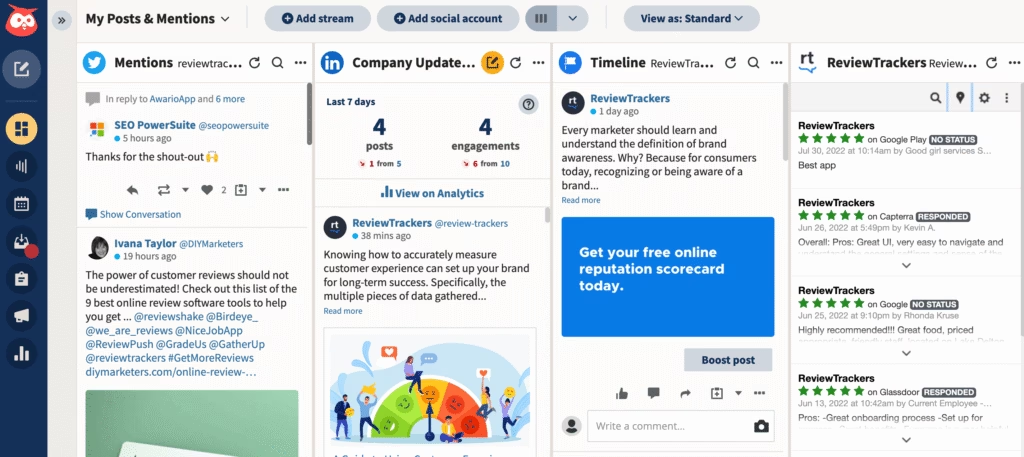
Core ReviewTrackers features include review monitoring, automated feedback requests, competitor analysis, local SEO reporting, and customer experience analytics. Businesses are able to add employer brand monitoring, software review monitoring, and app store review tracking as extensions, which makes ReviewTrackers well-suited for enterprises that manage multiple touchpoints.
Compared to Synup, which emphasizes listings management and local visibility, ReviewTrackers provides stronger capabilities in review analysis, customer sentiment tracking, and multi-location benchmarking. This makes it the better choice for organizations that prioritize reputation intelligence and competitive positioning over directory accuracy.
ReviewTrackers pricing starts at $15 per location per month (paid annually) for high-volume enterprise deployments, with more standard rates beginning around $89 per location per month, depending on the plan and scale.
In comparison, Synup begins at $99/month, which means ReviewTrackers is possibly cheaper and more scalable for brands with many branches or franchises.
Pros mentioned in the ReviewTrackers review include robust analytics, customizable reporting dashboards, and strong customer support. Cons of ReviewTrackers are limited native social media engagement tools and a heavier focus on enterprise use cases, which is excessive for smaller, single-location businesses.
15. Vendasta: Best Synup Alternative for Agencies & Resellers
Vendasta is the best Synup alternative for agencies and resellers. Vendasta is an all-in-one AI-powered customer acquisition and engagement platform built specifically for agencies, resellers, and enterprise partners.
Vendasta combines CRM, marketing automation, white-label reputation management, and a marketplace of rebrandable digital products.
Key features of Vendasta include AI-powered review management, automated lead capture, white-label CRM, unified client reporting, and an expansive marketplace of SEO, social, and advertising tools.
Agencies brand Vendasta as their own platform, which makes it ideal for resellers who want to deliver scalable digital services without building the infrastructure themselves.

Compared to Synup, which focuses primarily on local listings accuracy and visibility, Vendasta offers a broader scope with white-label automation, client management portals, and a marketplace approach. This makes Vendasta the stronger Synup alternative for agencies that want to manage multiple SMB clients, bundle reputation and SEO services, and expand their revenue streams.
Pricing for Vendasta is available only through custom quotes, with flexible tiers for agencies, franchisors, and SaaS providers. While Synup starts at $99/month, Vendasta typically requires a higher investment but offers significantly more scalability and white-label capabilities tailored to agency needs.
The advantages listed in the Vendasta review are its wide marketplace of rebrandable products, strong white-label branding options, and AI-driven automation that reduces manual client management work.
The disadvantage of Vendasta is that pricing is opaque and often higher than Synup, and the platform feels complex for small businesses that only need basic reputation or listings management.
16. Advice Local: Best Synup Alternative for Automated Local Search Reporting
Advice Local is the best Synup alternative for automated local search reporting. Advice Local is a local presence management platform designed for agencies, brands, and franchises that need real-time visibility reporting and automated citation distribution.
Advice Local partner dashboard provides white-label reporting, Google Business Profile (GBP) management, and automated submissions to top directories, data aggregators, and navigation systems.
Key features include the Data Amplifier Network, which pushes business information to platforms like Google, Yelp, Apple Maps, and Facebook, as well as an Enhanced GBP Tool for syncing, rejecting public edits, and accessing detailed performance insights.
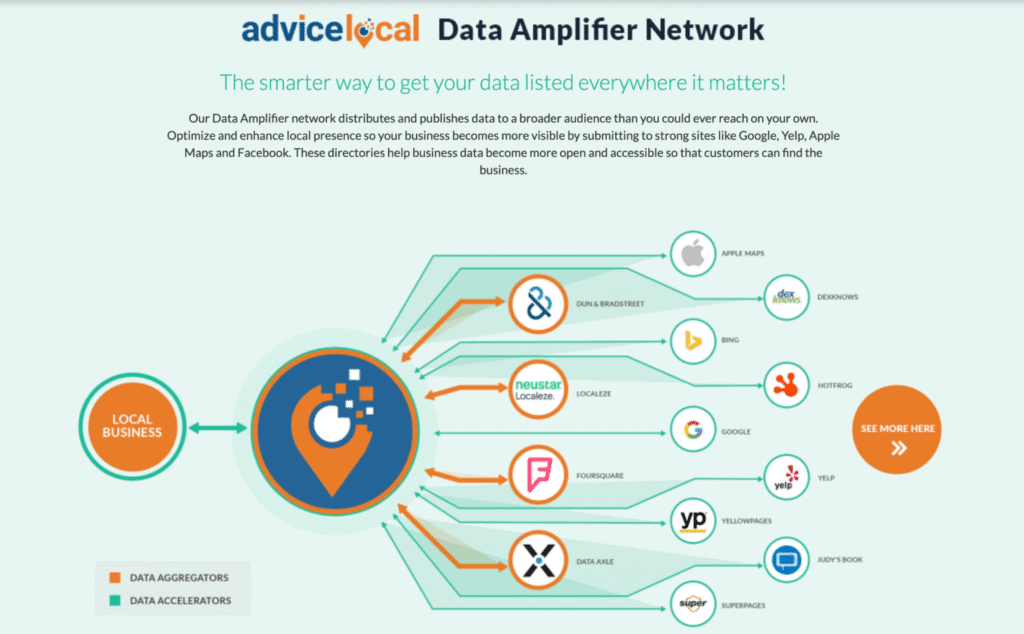
Agencies use the Advice Local Local Rank Tracker for Google Maps and organic reporting, voice search readiness scores, and vertical directory submissions for specialized industries (healthcare, legal, automotive).
Compared to Synup, which centers on listing accuracy and review monitoring, Advice Local emphasizes reporting automation and multi-channel distribution. This makes it a stronger alternative for agencies that require large-scale local presence management and detailed performance analytics across client portfolios.
Advice Local pricing is not published and is only available through custom quotes. Synup starts at $99/month, while Advice Local is typically positioned at a higher price point for agency partners, which reflects its emphasis on white-label dashboards and advanced reporting tools.
Pros highlighted in the Advice Local review are advanced white-label features, real-time data syncing, and robust reporting automation that scales across thousands of locations.
Cons of Advice Local are the lack of transparent pricing and the complexity that feels excessive for single-location businesses that only need basic directory listings.
17. dbaPlatform: Best Synup Alternative for GBP Listing Automation
dbaPlatform is the best Synup alternative for GBP listing automation. dbaPlatform is a listings automation and local advertising solution built by former Google employees.
dbaPlatform is a suitable Synup alternative for multi-location brands, agencies, and retailers to manage Google Business Profiles (GBP), Apple Maps, and Microsoft listings at scale.
The platform integrates local ad campaigns and inventory feeds, which makes it a specialized choice for businesses that rely heavily on accurate GBP optimization.
The dbaPlatform software offers business listing management, review monitoring, photo and video posting, Q&A management, and product or vehicle inventory syndication.
Agencies use the bulk automation features to sync and update data across hundreds of profiles, while brands benefit from centralized dashboards for local presence and foot traffic growth. Its managed services add an extra layer of support, with ex-Googlers directly overseeing ad campaigns and listings optimization.
Compared to Synup, which provides broader reputation and listings management, dbaPlatform is more tightly focused on GBP automation and multi-platform listings. This makes it a better fit for industries like automotive, retail, and franchises, where inventory ads and real-time listing updates directly impact sales.
Pricing is not published. dbaPlatform uses a custom pricing model depending on the number of locations, integrations, and managed services required.
The advantages highlighted in the dbaPlatform review include deep integration with Google, Apple, and Microsoft, strong automation for GBP updates, and specialized inventory tools.
The disadvantages of dbaPlatform are the lack of transparent pricing and a steeper learning curve for small businesses that only need simple listing management.
18. Devhub: Best Synup Alternative for Multi-Location Site Management
Devhub is the best Synup alternative for multi-location site management. Devhub makes it easy to create, launch, and maintain digital properties at scale. It centralizes corporate websites, franchise development pages, store locators, microsites, and local landing pages into one infrastructure.
Devhub is a fit for brands that manage hundreds of distributed sites across industries such as home services, restaurants, retail, and healthcare (Spray Net, Mosquito Authority, Venture X).
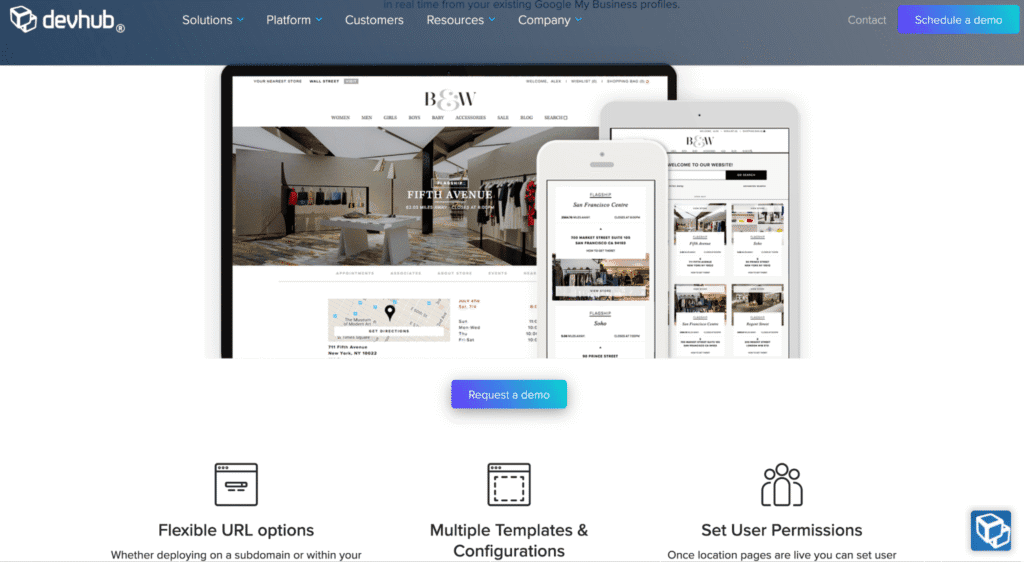
The Devhub platform provides localized page creation, store locators, headless CMS functionality, reporting dashboards, and integrations with 75+ martech and ordering systems. Enterprise users rely on Devhub to migrate sites from legacy CMS platforms, standardize location pages for SEO, and manage campaign landing pages with centralized control.
The flexibility of “do-it-yourself,” co-managed, or fully headless API models enables internal teams or agencies to adapt deployment to their operational needs.
Compared to Synup, which focuses on listings and reputation management, Devhub addresses the structural layer of location-based digital presence. Synup distributes business data to directories, while Devhub consolidates web infrastructure to manage brand consistency and digital performance across hundreds of sites.
Devhub pricing starts at $9,999 for basic implementation and $1,999/month for ongoing SaaS access. Optional services for design, production, and platform management are available at additional cost.
Synup starts at $99/month, so Devhub represents a higher investment suited for enterprise and franchise operators that need complex, multi-site infrastructure.
Pros included in the Devhub review are enterprise-level scalability, strong API extensibility, and direct integrations with marketing and ordering tools.
Cons of Devhub are the high entry cost and limited relevance for small businesses that only need listings management rather than multi-site web deployments.
19. Semrush: Best Synup Alternative for Competitive Research
Semrush is the best Synup alternative for competitive research and a full suite of marketing tools. Semrush is a digital marketing platform that combines SEO, PPC, content, and social media tools into one suite. It is best known for its competitive research features, which allow users to analyze domains, track keyword rankings, study backlink profiles, and compare performance across multiple competitors.
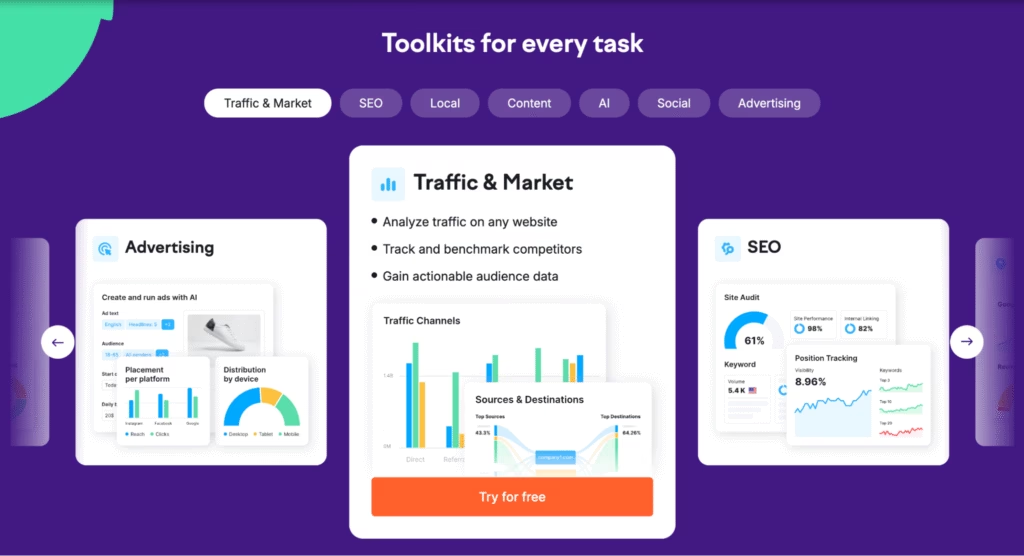
Agencies, consultants, and in-house marketers use Semrush to gain visibility into how rival brands perform and where opportunities exist.
Semrush includes Domain Overview, Keyword Magic Tool, Organic Research, Backlink Analytics, Position Tracking, and Site Audit. These features allow users to benchmark visibility, identify keyword gaps, and monitor SEO campaigns.
The competitive data in Semrush is a central reason many businesses adopt it, as it highlights search terms and strategies competitors are using.
Compared to Synup, which focuses on local listings management and reputation monitoring, Semrush is a broader marketing intelligence tool. Synup helps optimize business data consistency across directories. Semrush provides keyword-level insights, backlink intelligence, and traffic estimates that provide competitive positioning in organic and paid search.
Semrush pricing starts at $139.95/month for the Pro plan, scaling to $249.95 for Guru and $499.95 for Business. Add-ons such as additional users or local SEO packages increase costs. Semrush is therefore significantly more expensive than Synup, which starts at $99 per month, but the tools serve different use cases. Semrush is built for competitive research and multi-channel marketing insights, not local SEO infrastructure.
Pros mentioned in the Semrush review are a wide feature set, strong competitor analysis, and consolidated reporting. Cons of Semrush include high pricing, restrictive limits on lower-tier plans, and occasional data inaccuracies in traffic estimates.
20. SE Ranking: Best Synup Alternative for Affordable SEO Management
SE Ranking is the best Synup alternative for affordable SEO management across small businesses, freelancers, and mid-sized agencies. SE Ranking is an all-in-one SEO platform that combines rank tracking, technical audits, backlink monitoring, on-page optimization, and competitor analysis.
Agencies and consultants use SE Ranking to manage keyword visibility, benchmark rivals, and track client campaigns with white-label reports.
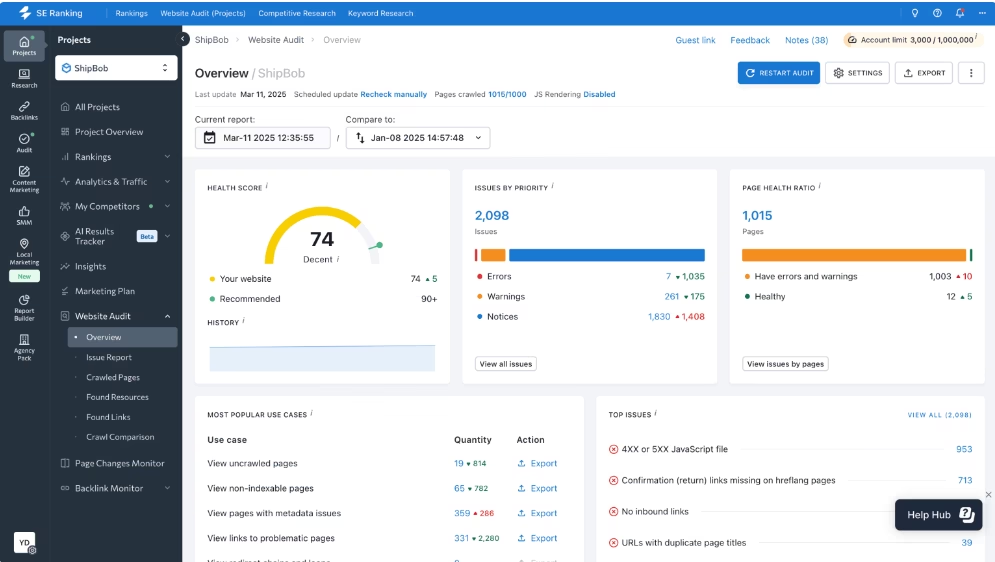
Key features of SE Ranking include a Rank Tracker for keyword monitoring across locations and devices, a Website Audit that scans for crawl and technical issues, and an On-Page SEO Checker that benchmarks optimization factors.
It offers a Backlink Checker for monitoring referring domains, and a Local Marketing Tool for Google Business Profile management. SE Ranking includes a Content Editor for SERP-driven content guidelines and competitor-based analysis.
SE Ranking is an alternative to Synup because it provides broader SEO tools at a lower entry cost.
SE Ranking offers a more comprehensive toolkit for ranking improvements and competitive insights, while Synup specializes in listings management and review monitoring. This makes SE Ranking more relevant for users who need keyword tracking and technical SEO coverage alongside local optimization.
SE Ranking pricing starts at $65/month for the Essential plan, with higher tiers at $119/month and $259/month depending on keyword volume, projects, and user seats.
Compared to the Synup Startup plan at $99/month for 25 locations, SE Ranking is cheaper for single websites or low-volume campaigns, but total costs rise quickly with add-ons like the Local Marketing Tool or Content Editor.
The advantages in the SE Ranking review are beginner-friendly dashboards, affordable rank tracking, white-label reporting for agencies, and bundled SEO features at a lower entry price than most full-suite platforms.
The disadvantages of SE Ranking include data accuracy issues in rank tracking, a smaller backlink index, limited integrations outside Google tools, and reliance on paid add-ons for local and content features.
21. SEO PowerSuite: Best Synup Alternative for Advanced SEO Analysis
SEO PowerSuite is the best Synup alternative for advanced SEO analysis with a desktop-first design. SEO PowerSuite includes 4 main tools that include Rank Tracker, Website Auditor, SEO SpyGlass, and LinkAssistant. Businesses use SEO PowerSuite to run keyword tracking, technical audits, backlink analysis, and link-building outreach directly from a local machine.
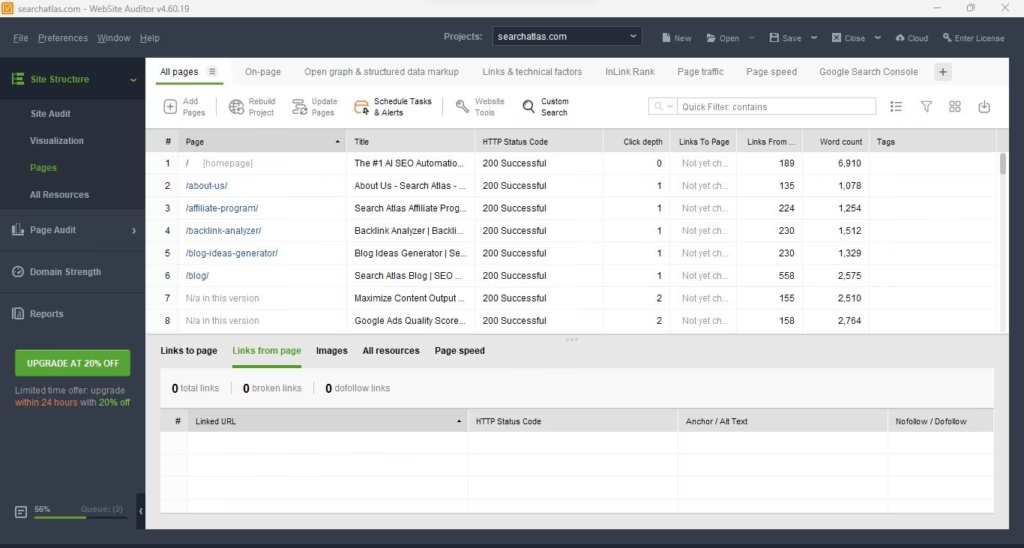
Key features of SEO PowerSuite include unlimited keyword rank tracking across search engines, site audits that evaluate crawlability and Core Web Vitals, backlink analysis with penalty risk scoring, and outreach workflows for link prospecting.
Unlike Synup, which emphasizes local listings and review management, SEO PowerSuite focuses on deep analysis of rankings, technical SEO, and backlink intelligence. This makes SEO PowerSuite a Synup alternative for consultants and agencies that need offline tools with flexible reporting.
SEO PowerSuite pricing starts with a free plan with limited functionality. Paid licenses range from $299/year for Professional to $699/year for Enterprise, with options for unlimited keywords and white-label reporting.
Compared to the Synup Startup plan at $99/month, SEO PowerSuite is more cost-effective for keyword-heavy campaigns but lacks cloud collaboration and real-time syncing.
Pros in the SEO PowerSuite review include cost-effective unlimited tracking, deep backlink and audit features, and offline access for data control.
Cons of SEO PowerSuite are an outdated Java interface, slower performance on large projects, a lack of integrations with modern SaaS tools, and no automation for applying fixes.
22. Ahrefs: Best Synup Alternative for Backlink Research & Link Data
Ahrefs is the best Synup alternative for backlink research and link intelligence. The Ahrefs SEO platform centers its toolset on Site Explorer, Keywords Explorer, Rank Tracker, and Site Audit, with backlink analysis being its strongest capability.
SEO professionals use Ahrefs to uncover competitor link strategies, track keyword rankings, and identify technical SEO issues that affect site performance.
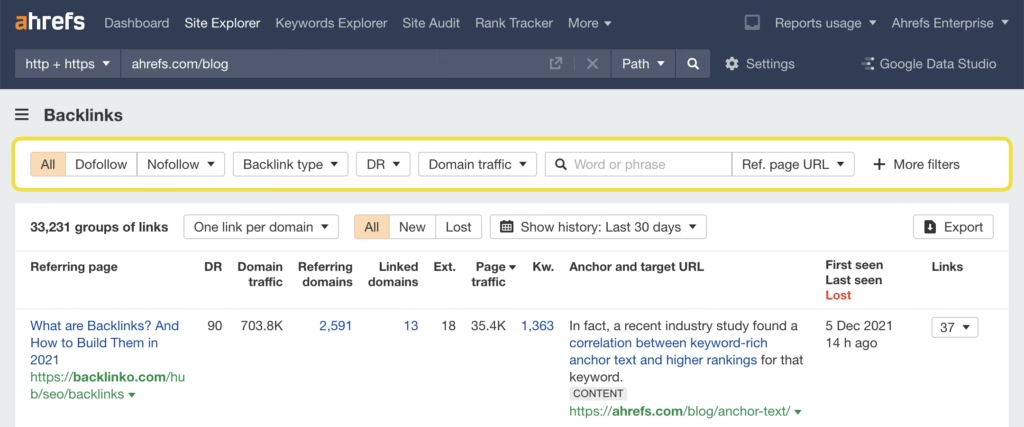
Compared to Synup, which focuses on local listings, citations, and review management, Ahrefs specializes in global-scale backlink data and keyword intelligence. Its index includes 35 trillion backlinks and 110 billion keywords, which it a choice for agencies or brands that are prioritizing off-page SEO and large-scale competitor benchmarking.
Synup helps multi-location businesses improve local visibility, while Ahrefs serves teams that need link growth monitoring, domain authority benchmarking, and international keyword research.
Ahrefs pricing starts with a free Webmaster Tools plan, then moves into paid tiers, including Lite ($129/month), Standard ($249/month), Advanced ($449/month), and Enterprise ($1,499/month).
Ahrefs plans are $30 more expensive than the entry-level pricing at $99/month, especially as Ahrefs enforces credit-based usage limits. While Ahrefs delivers unmatched backlink depth, its cost structure is higher and less flexible for small businesses.
Pros in the Ahrefs review include its extensive backlink database, global keyword coverage, and competitor research features. Cons of Ahrefs include high pricing, restrictive quotas on lower plans, limited integrations, and reports of data discrepancies compared to first-party tools like Google Search Console.
23. Google Search Console: Best Synup Alternative for Free Search Performance Insights
Google Search Console (GSC) is a free tool from Google that provides direct insights into how websites perform in organic search. Google Search Console is the best Synup alternative for businesses that want search visibility data, indexing insights, and site performance metrics without subscription costs.
Core GSC features include search query reporting, index coverage, page experience metrics, and URL inspection, which make it a fundamental platform for SEO monitoring.
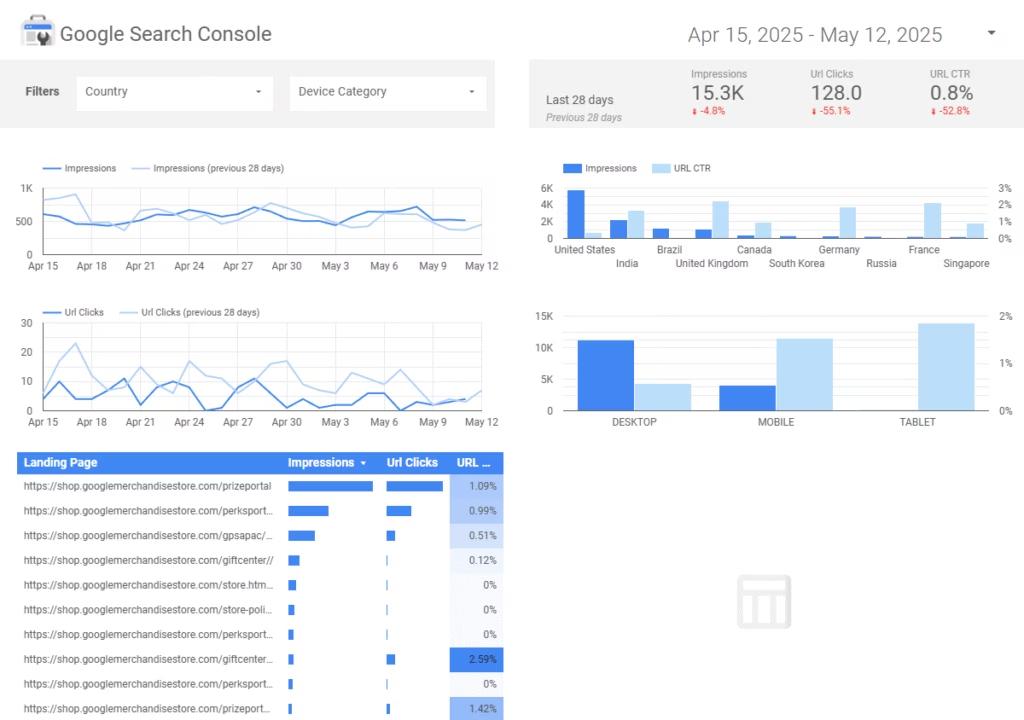
Unlike Synup, which focuses on local listing management and reputation signals, GSC provides first-party data straight from Google Search. This makes it ideal for measuring keyword performance, identifying crawling or indexing issues, and reviewing site health signals.
While Synup helps multi-location brands track reviews and listings across directories, GSC focuses exclusively on search traffic, CTRs (click-through rates), and ranking signals at the website level.
Google Search Console is completely free, which differentiates GSC from the $99/month starting price in Synup. However, GSC does not include review monitoring, local directory updates, or multi-location management features that Synup provides. It works best when paired with third-party SEO tools for broader workflows.
According to our Google Search Console review, direct Google data, zero cost, and essential indexing diagnostics are benefits.
The downsides of GSC include limited local SEO functionality, no review or citation features, and data delays compared to paid analytics platforms.
24. Scalenut: Best Synup Alternative for AI-Powered SEO Content
Scalenut is the best Synup alternative for brands that want to scale AI-powered SEO content and optimize for Google and emerging AI engines. Scalenut is an AI-driven SEO platform that combines keyword clustering, long-form content generation, and on-page optimization in one interface.
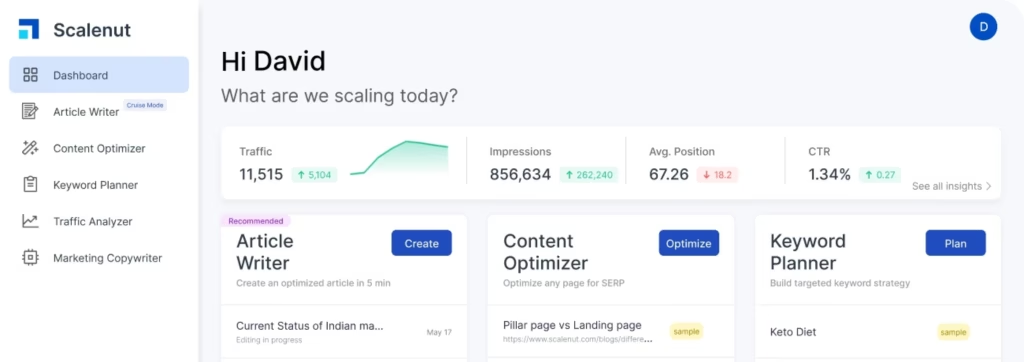
Key Scalenut features include topic discovery, content automation, Cruise Mode for rapid article generation, GEO (generative engine optimization) scoring for AI visibility, and a backlinks marketplace.
Unlike Synup, which specializes in local listings and review management, Scalenut focuses on content creation, AI optimization, and brand visibility in search and AI-powered answer engines.
Scalenut is a better-suited Synup alternative for marketers, agencies, and businesses that prioritize SEO-driven growth and AI readiness over directory management.
Scalenut pricing starts at $49/month with plans and scales up to $149/month, compared to the Sybup $99/month base pricing. This makes Scalenut more cost-effective for teams that need advanced content SEO tools rather than multi-location directory coverage.
The pros mentioned in the Scalenut review are fast AI-driven content workflows, integrated keyword clustering, strong content scoring, and optional managed services. Cons of Scalenut include a lack of directory management, review monitoring, and local citation features offered by Synup.
25. WebCEO: Best Synup Alternative for Agency SEO Toolsets
WebCEO is the best Synup alternative for agency SEO toolsets. WebCEO is an SEO platform that includes 24+ professional-grade SEO tools for keyword research, rank tracking, technical audits, backlink monitoring, social media analytics, and competitor benchmarking.
Agencies use WebCEO for lead generation, client reporting, and white-label SEO hubs that they brand under their own domains.
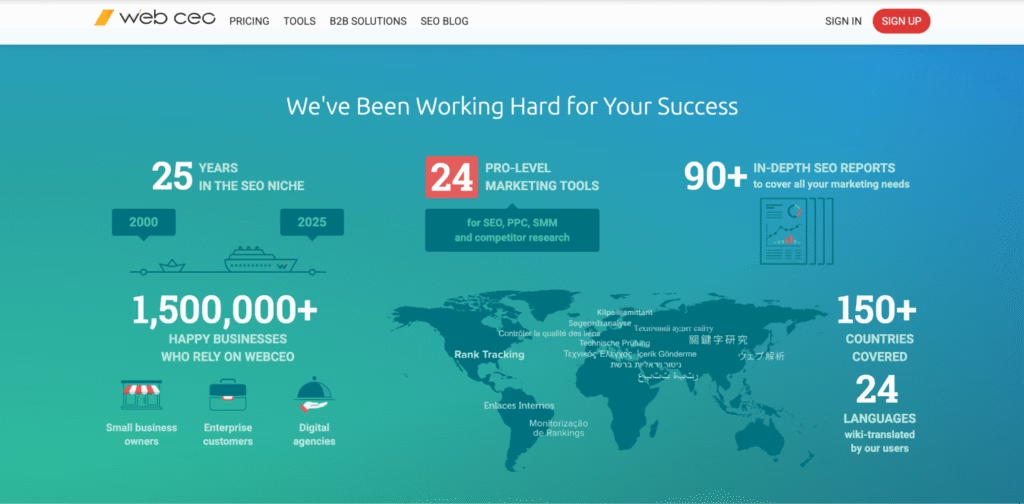
Key features of WebCEO include rank tracking across 370+ search engines, keyword research with multiple data sources, detailed site audits for technical issues, backlink and toxic link checkers, competitor backlink spy, Google Business Profile monitoring, and social analytics.
WebCEO is an alternative to Synup because it provides a much broader toolset for SEO management, whereas Synup focuses primarily on directory listings and reputation monitoring.
Agencies that choose WebCEO gain competitive research, technical audits, and reporting automation alongside local SEO tools. Compared to Synup, WebCEO suits SEO-driven agencies that need advanced keyword tracking, backlinks, and multi-client workflows.
WebCEO pricing starts at $99/month for the Startup plan (5 projects, 750 keywords, 5,000 pages audited, and 10,000 backlinks). The Corporate plan is $251/month with higher quotas, while Agency Unlimited starts at $83/month plus scanning fees (billed annually) with unlimited projects, unlimited keywords, and white-label tools.
Compared to the Synup $99/month Startup plan, WebCEO delivers a wider range of SEO capabilities for the same entry price, but becomes more expensive with scanning fees and larger client portfolios.
The advantages that WebCEO review highlights are an agency-first design, broad SEO coverage in one dashboard, white-label customization, multilingual support across 24 languages, and lead-generation capabilities.
The disadvantages of Web CEO include a steeper learning curve for beginners, added costs for heavy scanning, and a more complex setup compared to the streamlined local SEO model in Synup.
26. Mangools: Best Synup Alternative for Simple Keyword and Rank Tracking
Mangools is the best Synup alternative for simple keyword and rank tracking. Mangools is a lightweight SEO suite that bundles 5core tools into one platform. It includes KWFinder for keyword research, SERPChecker for SERP analysis, SERPWatcher for rank tracking, LinkMiner for backlink analysis, and SiteProfiler for domain metrics.
Mangools is best suited for freelancers, bloggers, affiliate marketers, and small businesses that want a clear, beginner-friendly toolkit without the cost or complexity of enterprise platforms.
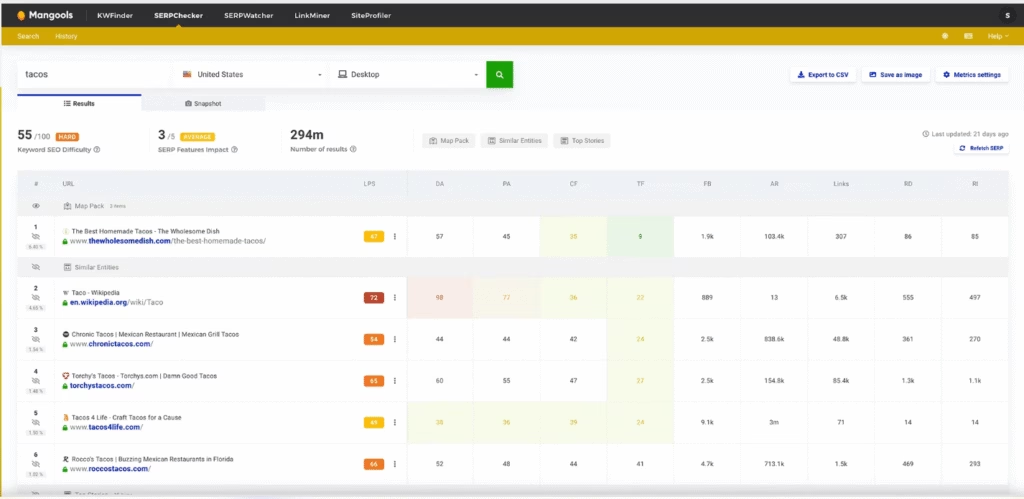
Key features of Mangools include a keyword database of 2.5 billion terms with global and local search volumes, 45+ SEO metrics and location-based SERP analysis, daily rank tracking with a performance index, a backlink index powered by Majestic data, and domain authority reports with competitor benchmarking.
Mangools provides SERP simulation, historical keyword trends, and simple client report sharing.
Mangools is an alternative to Synup because it focuses on keyword, ranking, and backlink data, while Synup emphasizes listings and reputation management.
Mangools appeals to users who want straightforward SEO tracking and research tools, whereas Synup fits agencies and businesses that need directory accuracy and review workflows.
Mangools pricing starts at $24.50/month for the Basic plan (100 lookups daily, 200 tracked keywords, 100,000 backlink rows). The Premium plan is $34.50/month with higher quotas and 3 user seats, while the Agency plan is $64.50/month with 1,200 lookups, 1,500 tracked keywords, and 5 user seats. All plans include the same tools, with limits scaling by tier.
Compared to Synup with the $99/month Startup plan, Mangools is cheaper but covers fewer aspects of local SEO.
The upsides noted in the Mangools review include its clean and simple interface, affordable entry price, bundled toolset, and clear reporting for beginners.
The downsides of Mangools are slower data refresh rates, tight usage limits on lower tiers, limited technical SEO coverage, and a smaller backlink database than competitors.
27. Serpstat: Best Synup Alternative for Affordable SEO and PPC Suite
Serpstat is an SEO and PPC platform with over 50 integrated tools for keyword research, rank tracking, site audits, backlink analysis, competitor analysis, AI content generation, and reporting.
Serpstat expanded from a keyword research tool in 2013 into a full-suite solution that operates across 230 regions and indexes 7.5 billion keywords, 1.5 billion domains, and 500 billion backlinks.
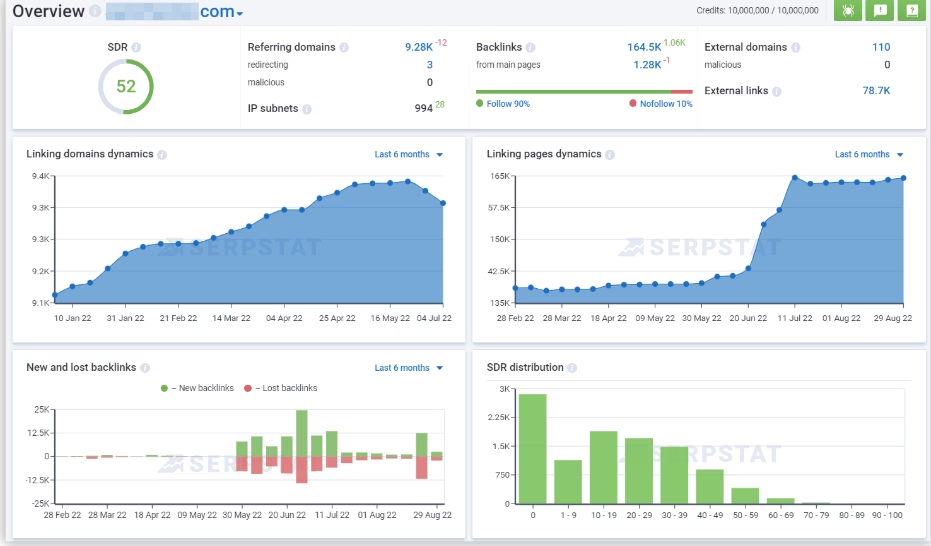
Key features of Serpstat are keyword clustering for topical grouping, daily SERP rank tracking across mobile and desktop, site audits with Domain Optimization (SDO) scores, backlink profile evaluation with anchor and SDR metrics, competitor visibility analysis, and API access with export functions.
White-label reporting is available for agencies that need client-ready outputs.
Serpstat is an alternative to Synup because it provides a broad SEO and PPC workflow. Synup specializes in listings management and reputation automation.
Businesses use Serpstat for ranking diagnostics, backlink monitoring, and technical audits, while Synup is used for review management, directory consistency, and reputation building.
Serpstat pricing starts at $69/month for the Individual plan with 5 projects, 100 daily searches, and 30,000 audited pages. The Team plan costs $129/month and increases quotas with API access, while the Agency plan costs $499/month and includes 1.5 million audit pages and branded reporting.
Synup pricing starts at $99/month, so Serpstat is a lower entry-cost option for SEO workflows.
Pros highlighted in the Serpstat review are affordable entry pricing, broad SEO and PPC coverage, keyword clustering accuracy, and customizable reporting.
The cons of Serpstat are slower interface performance on large datasets, smaller backlink coverage compared to premium tools, and limited updates in feature development.
28. Hootsuite: Best Synup Alternative for Social Media Marketing Management
Hootsuite is the best Synup alternative for social media marketing management. Hootsuite is a social media management platform that centralizes scheduling, publishing, analytics, messaging, and listening into a single dashboard. The platform integrates with over 100 third-party tools (Canva, Salesforce, Talkwalker) and provides AI-driven functions through its OwlyGPT assistant.
Hootsuite focuses on cross-network coordination, competitor benchmarking, and customer engagement, which makes it distinct from the focus on listings and review automation that Synup has.
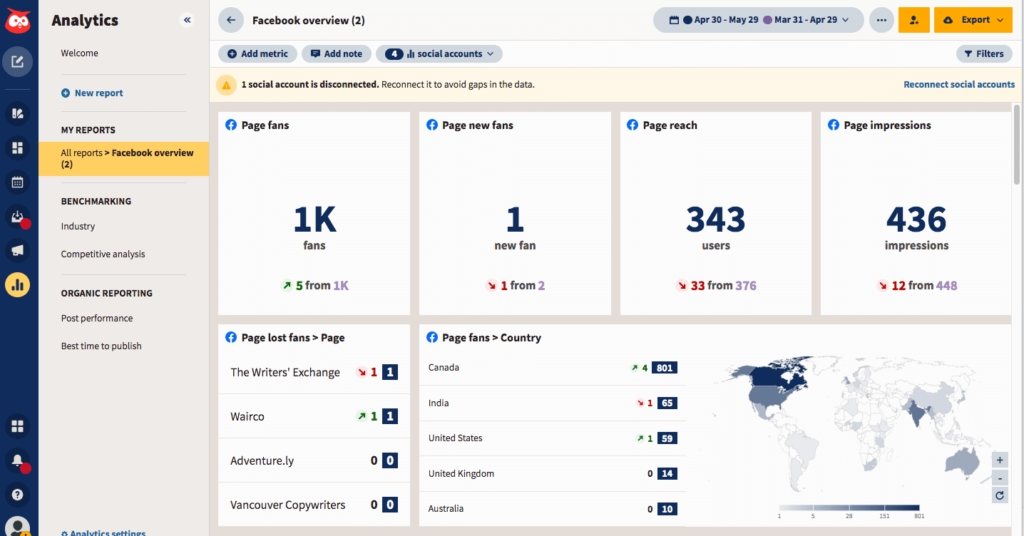
Key features of Hootsuite are unified inbox management for cross-platform DMs, automated scheduling with recommended posting times, customizable analytics reports with competitor benchmarking, sentiment analysis for brand monitoring, and AI-assisted content ideation with caption and hashtag generation.
Social listening tools track mentions, trending topics, and audience sentiment across networks (Twitter, Instagram, LinkedIn).
Hootsuite is an alternative to Synup because it manages customer-facing engagement on social networks, while Synup manages local directory consistency and reputation.
Businesses use Hootsuite to plan campaigns, monitor brand perception, and increase reach, while Synup is used to maintain NAP accuracy, automate review responses, and update GBP listings.
Hootsuite pricing starts at $149/month for the Standard plan, which includes 10 social accounts, unlimited scheduling, best time to post insights, and basic sentiment analysis. The Advanced plan costs $399/month and expands features with bulk scheduling, 20 competitor benchmarks, custom analytics templates, and inbox reporting. Enterprise pricing is custom and includes compliance integrations, employee advocacy, advanced analytics, review management, and Talkwalker-powered listening.
Synup pricing starts at $99/month, which positions Hootsuite as a higher-cost but broader engagement platform.
The benefits noted in the Hootsuite review are deep integration with over 100 tools, advanced social listening with trend detection, and AI-assisted campaign planning.
Downsides of Hootsuite are high entry pricing for small businesses, complex interface navigation, and reliance on add-ons for advanced analytics (Talkwalker, Proofpoint, Salesforce).
29. Brand24: Best Synup Alternative for Social Media Listening
Brand24 is the best Synup alternative for social media listening. Brand24 is a social listening platform that monitors over 25 million online sources in real time (social media, forums, news). The Brand24 platform detects brand mentions, tracks hashtags, and applies sentiment analysis to classify discussions as positive, negative, or neutral.
Brand24 provides metrics for awareness, reach, and share of voice, which distinguishes it from the directory and review management focus that Synup provides.
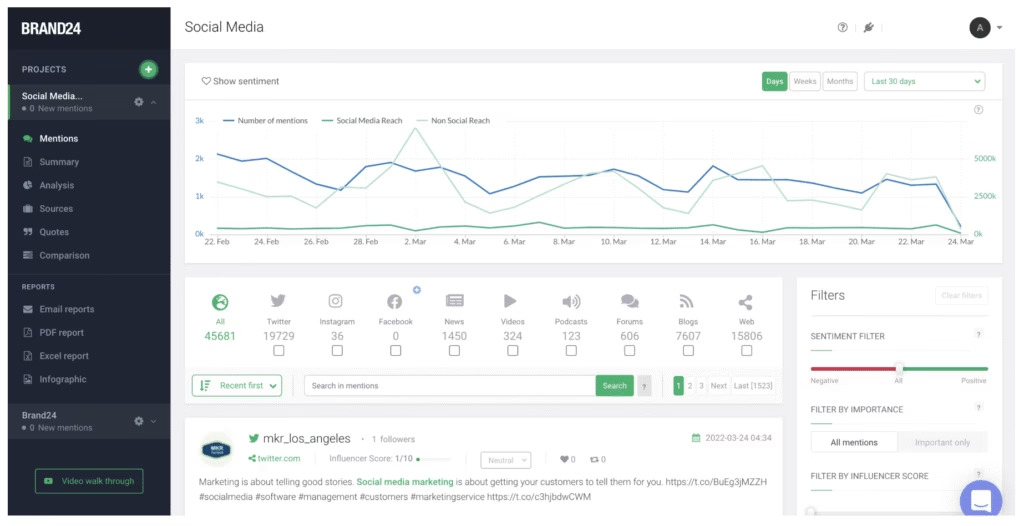
Key features of Brand24 are AI-powered sentiment analysis with sarcasm detection, multilingual monitoring across 108 languages, customer insight reporting with word clouds, hashtag tracking with reach and volume metrics, and customizable PR coverage reports.
Data sources extend across major platforms (Twitter, Instagram, YouTube), forums (Reddit, TripAdvisor, Telegram), and app stores.
Brand24 is an alternative to Synup because it expands monitoring from reviews and business listings into full-spectrum online conversations. Businesses use Brand24 to measure brand health, benchmark competitors, and discover customer insights, while Synup maintains consistent directory data and automates local SEO tasks.
Brand24 pricing starts at $99/month, which aligns directly with the entry-level plan in Synup. Higher tiers include extended mention history, more users, and advanced analytics. Synup focuses on citation accuracy, while Brand24 pricing reflects advanced monitoring of sentiment and reach across millions of domains.
The main pros mentioned in the Brand 24 review are accurate sentiment classification in 108 languages, real-time alerts across 25 million monitored domains, and wide coverage of platforms beyond mainstream networks (Spotify, App Store, Telegram).
Cons of Brand 24 are limited integrations compared to larger platforms, higher costs for extended history storage, and occasional noise in large-scale data exports.
30. Marketing 360: Best Synup Alternative for All-in-One SMB Marketing
Marketing 360 is an all-in-one platform for small and medium businesses that integrates website building, CRM, payments, listings, reputation, email, and advertising. Marketing combines marketing technology with managed services from an in-house team.
Key features of Marketing 360 are a drag-and-drop website and ecommerce builder, CRM for lead tracking and reporting, business listing management across 50+ directories, review request and response tools, social media scheduling, email campaign automation, multi-channel ad management across Google and Meta, and performance dashboards with real-time reporting.
The suite integrates payments, forms, and calendars to consolidate SMB operations (sales, reputation, scheduling).
Marketing 360 is an alternative to Synup because it expands coverage from local listing accuracy into a complete SMB growth infrastructure.
Businesses use Marketing 360 to unify digital marketing, customer communication, and online reputation, while Synup specializes in maintaining citation accuracy and reviews.
Marketing 260 pricing starts at $395/month and scales by features and managed services. Plans include software access plus a dedicated marketing team. Synup starts at $99/month for listing and reputation management only, which makes Marketing 360 more expensive but broader in scope.
The upsides noted in the Marketing 360 review are a single platform for website, CRM, ads, and reputation, scalability for multiple industries (real estate, medical, contractors), and integration with AI-driven content visibility across search engines.
The downsides of Marketing 360 are higher costs compared to point tools, complexity for small teams with limited bandwidth, and dependency on in-house services for execution.
31. Hibu (RevLocal): Best Synup Alternative for Managed Local Marketing Services
Hibu, which acquired RevLocal in August 2024, provides managed digital marketing services for small and medium-sized businesses. RevLocal now operates as a Hibu company, with its services fully integrated into the Hibu One platform. This transition replaced the RevLocal independent operations with an all-in-one provider that combines listings, reputation, ads, and website services under a single dashboard.
Key features of Hibu (RevLocal) are listings management across 50+ directories, review generation and monitoring, paid ad campaigns on Google, Facebook, Amazon, and Bing, custom website design, marketing automation through email and SMS, and performance analytics through the Hibu One dashboard.
The platform applies AI-driven targeting and predictive optimization to improve campaign ROI across channels (search, display, social).
Hibu is an alternative to Synup because it covers the same local SEO and reputation functions but extends them with managed ad campaigns, website building, and direct account oversight. This positions Hibu as a stronger fit for businesses that prefer outsourced management compared to Synup’s self-service SaaS model.
Bubu pricing starts at custom quotes, usually above $300/month, depending on the package. Synup begins at $99/month, which makes Synup the cheaper software-only option, while Hibu provides higher-value managed execution for SMBs that want a full-service partner.
The Hibu review notes pros like integrated service delivery, outsourced account management, and AI-based ad targeting across multiple platforms.
The cons of Hibu are higher recurring costs, contract-based commitments, and less flexibility for advanced SEOs who want direct control over campaigns.
32. MyPresences: Best Synup Alternative for Automated Listings & Reviews
MyPresences is the best Synup alternative for automated listings and reviews. MyPresences is a listings and review management platform that automates updates, review collection, and online presence monitoring for local businesses. It integrates listings, reviews, social media scheduling, search performance tracking, and AI-based reporting.
MyPresences provides review campaigns across 300+ services, automated listing synchronization across 3,000+ directories, and multi-location dashboards with over 50 performance metrics. It includes keyword rank tracking for Google, Bing, and Google Maps.
Advanced tiers add AI review replies, AI business descriptions, and predictive insights across 18 language models (OpenAI, Anthropic, Google AI).
Compared to Synup, MyPresences is a better alternative for businesses focused on listings automation and review workflows. Synup emphasizes analytics and engagement management, while MyPresences provides higher listing coverage, direct AI review management, and stronger multi-location scalability.
MyPresences is paid and starts at $15/month for a single location. Business plans cost $50/month, and the Pro plan costs $100/month. The price is $40/location for 5 locations, and the prices change as the number of locations scales up.
The advantages outlined in the MyPresences review are the broad listing coverage, automated review campaigns, and strong AI-assisted workflows (review replies, review summaries, AI rank tracking).
The disadvantages of MyPresences are weaker campaign management, limited advanced SEO integrations, and fewer enterprise analytics compared to broader platforms (Search Atlas, Semrush, BrightLocal).
33. SearchManipulator: Best Synup Alternative for Reputation Management
SearchManipulator is a reputation management platform that removes negative content from Google search results and promotes positive brand visibility. Founded in 2010 by engineers, the company focuses on content removal, suppression, and replacement strategies designed to protect business and personal reputations.
SearchManipulator provides custom removal workflows for negative reviews, harmful press coverage, and outdated information.
It improves brand presence with positive content optimization and authority-building campaigns across search engines. Clients receive guaranteed results with a pay-for-performance model, meaning charges apply only after visible improvements.
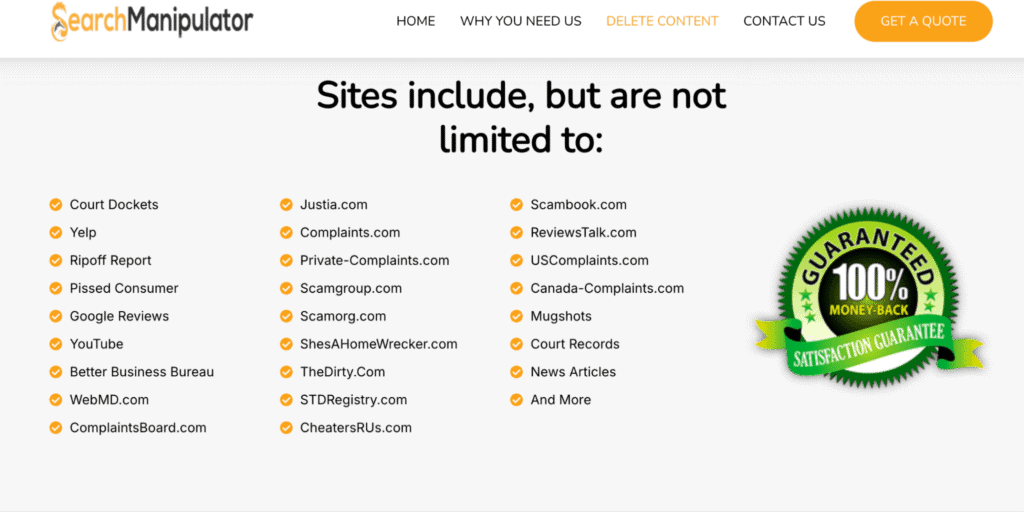
Compared to Synup, SearchManipulator is a better alternative for reputation management. Synup focuses on listing accuracy, local SEO insights, and review monitoring, while SearchManipulator specializes in removing or suppressing harmful content and improving brand sentiment.
Pricing is custom and based on project requirements. SearchManipulator uses a results-based structure with no monthly subscription, which makes it more expensive than Synup for long-term monitoring but more targeted for reputation recovery.
According to the SearchManipulator review, the pros are the guaranteed results model, expertise in negative content removal, and quick turnaround times (1 to 2 weeks for partial changes, 30 to 60 days for full removals).
Cons of SearchManipulator are the lack of broader SEO toolsets, absence of keyword or backlink analytics, and reliance on manual campaign oversight compared to multi-featured platforms (Search Atlas, BrightLocal, Yext).
34. Rio SEO: Best Synup Alternative for Enterprise Local SEO
Rio SEO is an enterprise local SEO platform designed for multi-location brands. Rio SEO uses its Local Experience (LX) suite to manage business listings, local landing pages, reviews, surveys, and customer interactions across thousands of locations.
Rio SEO integrations extend across search engines, map services, voice assistants, and social networks, enabling global brands to maintain accurate listings and consistent customer experiences at scale.
Features of Rio SEO include local listings management, local page creation, review monitoring, Voice of Customer (VoC) surveys, and advanced reporting dashboards. The LX platform also integrates with store locator tools, online ordering systems, and reputation management workflows.
Enterprise clients use the platform to consolidate local SEO tasks within one centralized system.
Compared to Synup, Rio SEO is the better alternative for enterprise-level local SEO. Synup focuses on small to medium-sized businesses with review monitoring and listing accuracy, while Rio SEO provides enterprise-grade scalability across thousands of locations with added functionality for VoC surveys, local page optimization, and global integrations.
Rio SEO pricing is available on request. Synup starts at $99 per month, while Rio SEO follows a custom enterprise pricing model that is typically more expensive but tailored to multi-location needs.
The advantages noted in the Rio SEO review are its scalability for enterprises, wide integration network, and combination of SEO with customer experience analytics (reviews, surveys, feedback).
The disadvantages of Rio SEO are its lack of accessibility for SMBs, higher pricing compared to SMB-focused tools (BrightLocal, Whitespark, Birdeye), and reliance on enterprise contracts instead of flexible subscriptions.
35. MomentFeed: Best Synup Alternative for Multi-Location Marketing
MomentFeed was a location-based marketing platform that enabled multi-location businesses to manage listings, reviews, and proximity-based search optimization. The company specialized in local customer engagement and store-level visibility across search engines, maps, and directories.
MomentFeed was acquired by Uberall in 2021 and has since been fully integrated into the Uberall CoreX platform. This integration expanded reach in multi-location marketing and combined the strengths of MomentFeed in local presence management with the global listing, reputation, and engagement solutions of Uberall.
Why Do People Seek Alternatives to Synup Tool?
People look for alternatives to Synup because reviews highlight high costs, feature limitations, and poor usability. Synup requires $99 per location with annual commitments, which creates problems for small businesses that operate on tighter budgets.
Some users describe the Synup interface as confusing, with a steep learning curve that reduces productivity. Others point out that customer support lacks responsiveness and that analytics data sometimes contains inaccuracies. Another frequent issue is limited functionality outside the US and Canada, which makes the tool less viable for global businesses (reviews on G2, Trustpilot, Capterra).
These recurring issues drive many businesses toward Synup competitors with broader coverage, lower pricing, and more reliable integrations.
What to Look for in a Synup Alternative?
A robust Synup alternative must deliver reliable listings management, effective reputation tracking, and scalable local SEO functionality. It must handle multi-location portfolios efficiently and provide integrations with major platforms (Google Business Profile, Apple Maps, Bing). Pricing needs to scale transparently according to location count. Per-location cost must remain competitive relative to the $99/month starting point in Synup.
What is the Difference Between Synup vs Yext?
The difference between Synup vs Yext is that Synup emphasizes agency- and SMB-friendly local listings, review monitoring, and multi-location workflows. Yext targets enterprise brands with a large publisher network and structured data integrations.
Synup provides lower-cost entry and flexible contracts, while Yext offers a broader directory ecosystem and deeper integrations with CRM and enterprise systems. Synup starts at around $99/month for entry plans, while Yext uses custom pricing often with annual commitments and higher tiers.
In terms of feature support in Synup vs Yext, Yext wins on directory coverage and enterprise scale, while Synup wins on ease of use and cost efficiency.
Why is Search Atlas the Best Synup Alternative?
Search Atlas is the best Synup alternative because it provides AI-powered local SEO automation, advanced keyword tracking, and unified campaign management that extend beyond listing accuracy.
Synup focuses on directory submissions and review monitoring with tiered pricing that restricts scalability. Search Atlas removes those constraints by combining local listings, reviews, heatmap-based rank tracking, and AI content optimization in one platform. Agencies and enterprises use it to automate keyword workflows, track rankings across geographies, and manage Google Business Profiles at scale (reviews, posts, profile analytics).
Search Atlas pricing starts at $99/month for the Starter plan with 2,000 keywords and two seats. Growth is $199/month with 3,500 keywords, while Pro is $399/month with 6,000 keywords. Enterprise tiers use custom quotes. Compared to the Synup Startup plan at $99/month for 25 locations, Search Atlas offers broader SEO features without per-location limits.
Search Atlas outperforms Synup in 3 key areas. Firstly, automation through OTTO SEO streamlines technical audits, on-page improvements, and reporting. Secondly, heatmaps provide precise local rank data across service areas (4-mile grids in New York, Los Angeles, Chicago). Thirdly, integrated content and citation tools allow agencies to scale deliverables within one dashboard (content optimization, citation ordering, review campaigns).
Start with Search Atlas today to replace isolated listing management with complete SEO automation, advanced rank tracking, and AI-powered content optimization.





